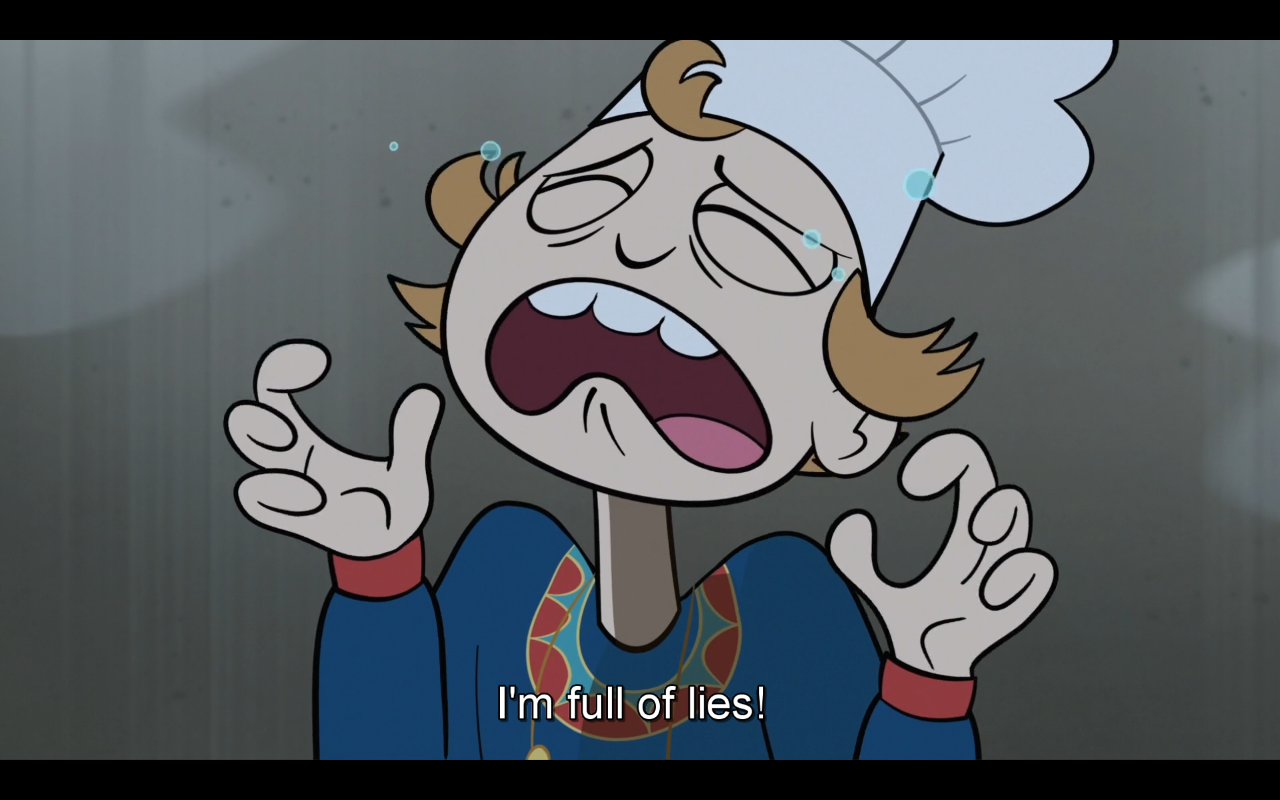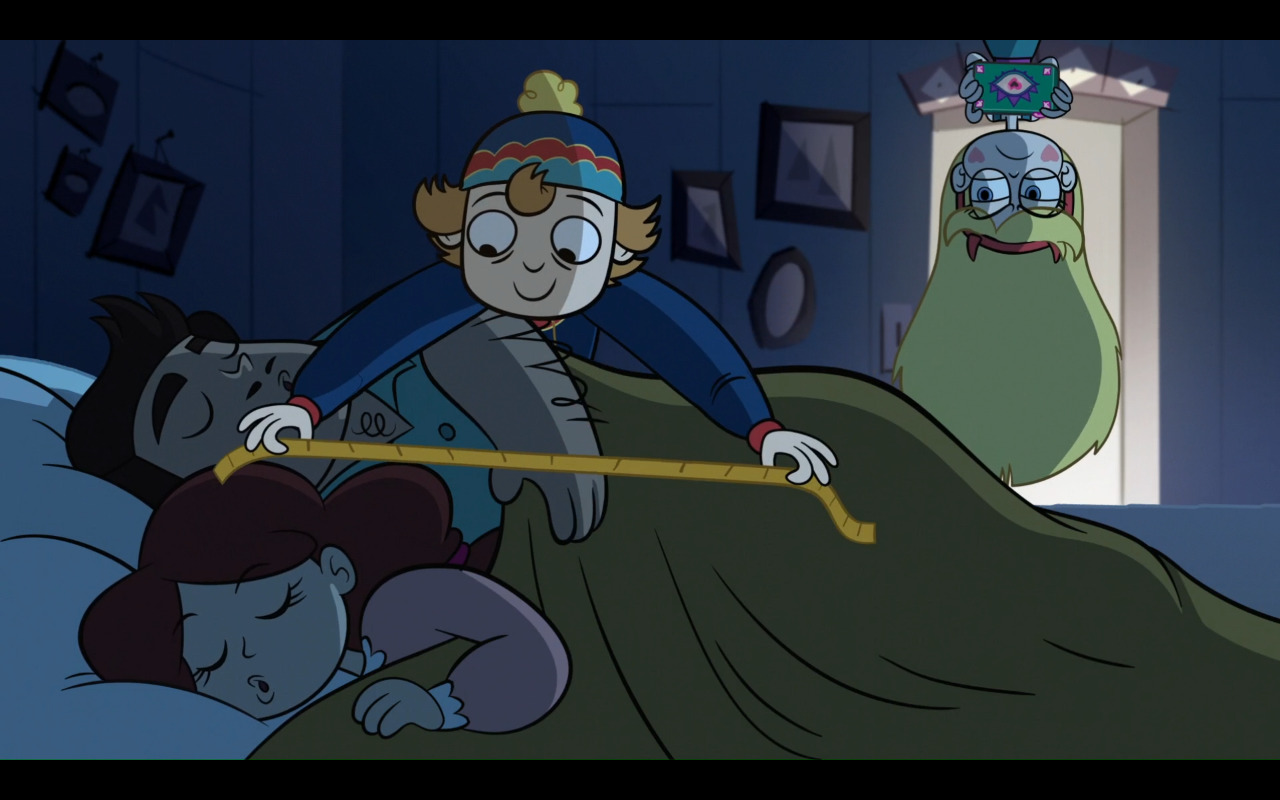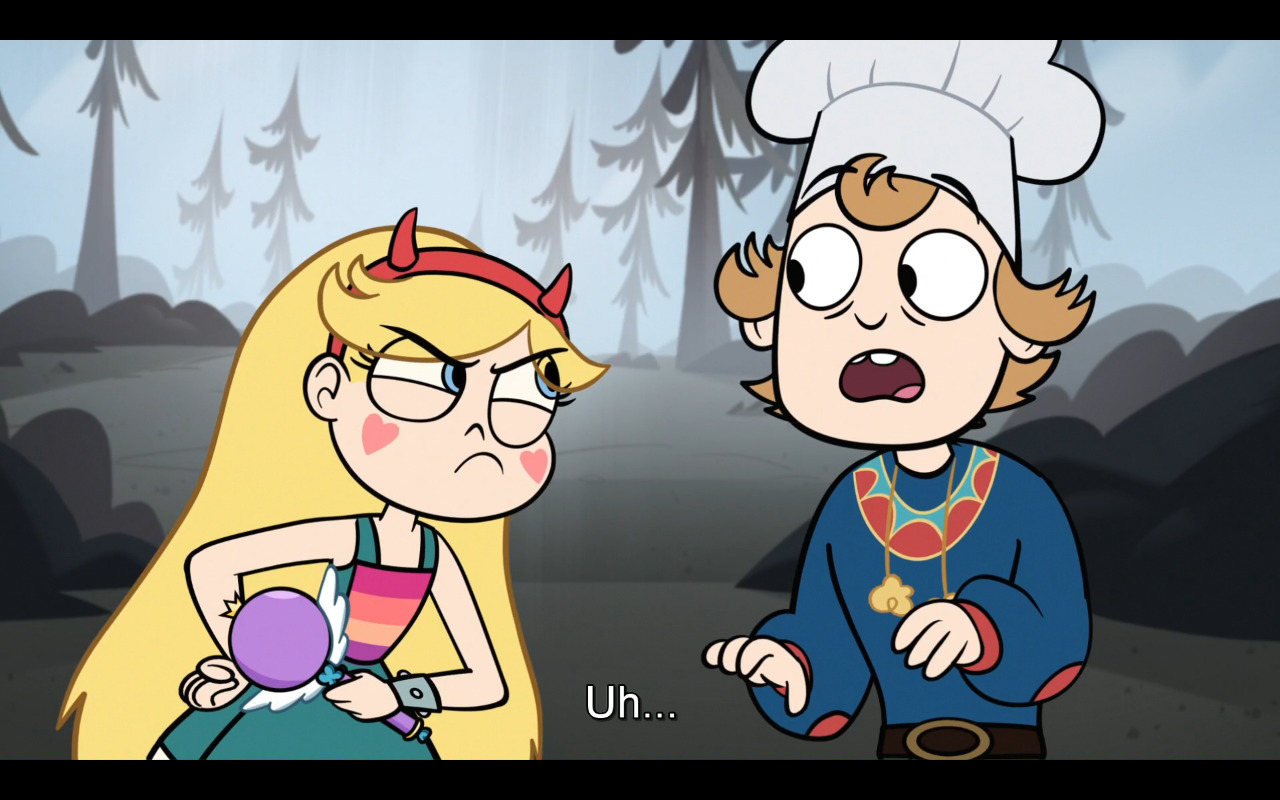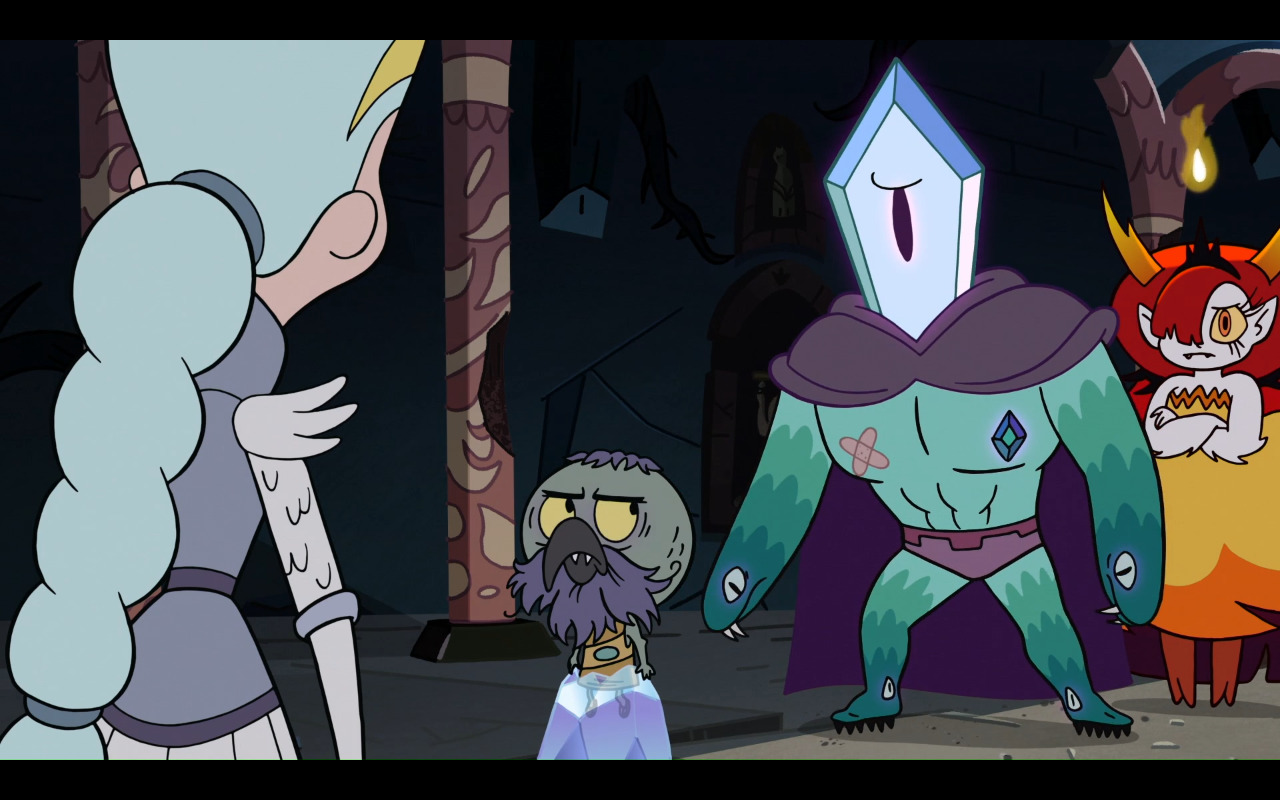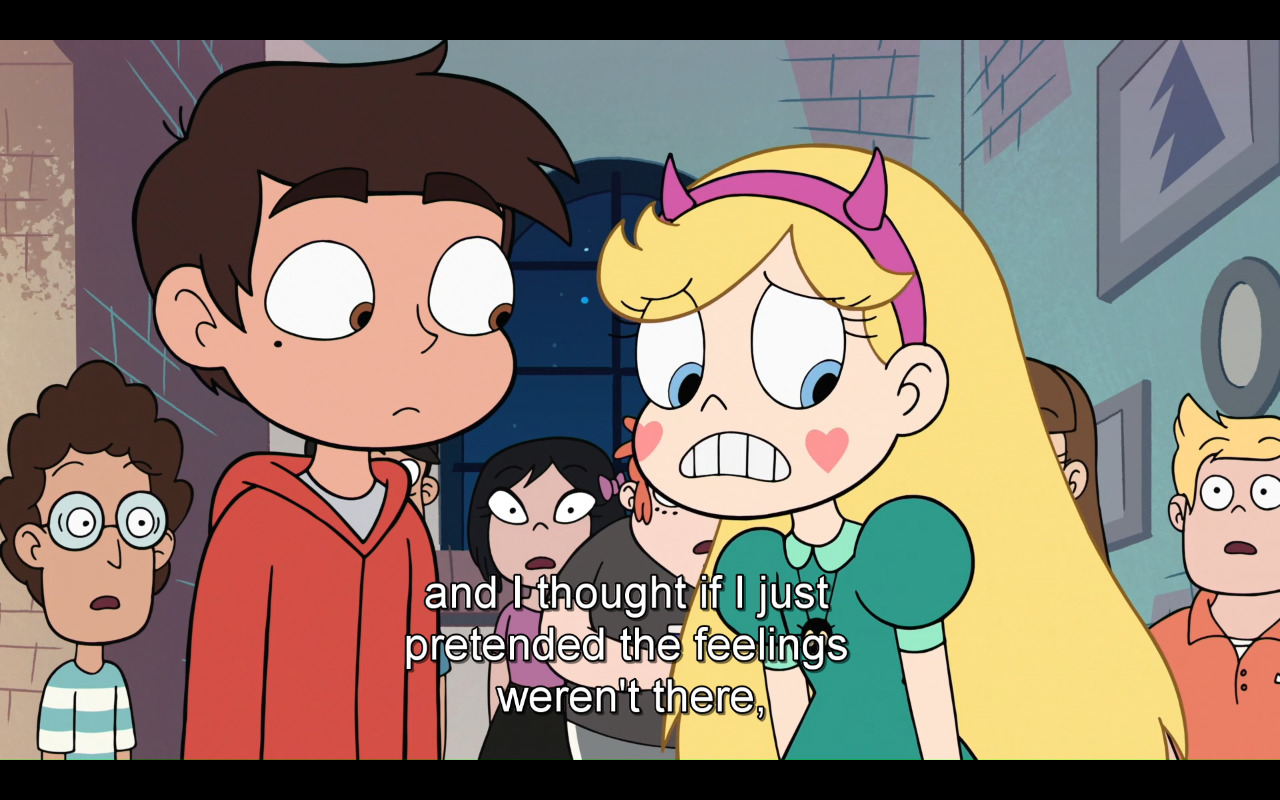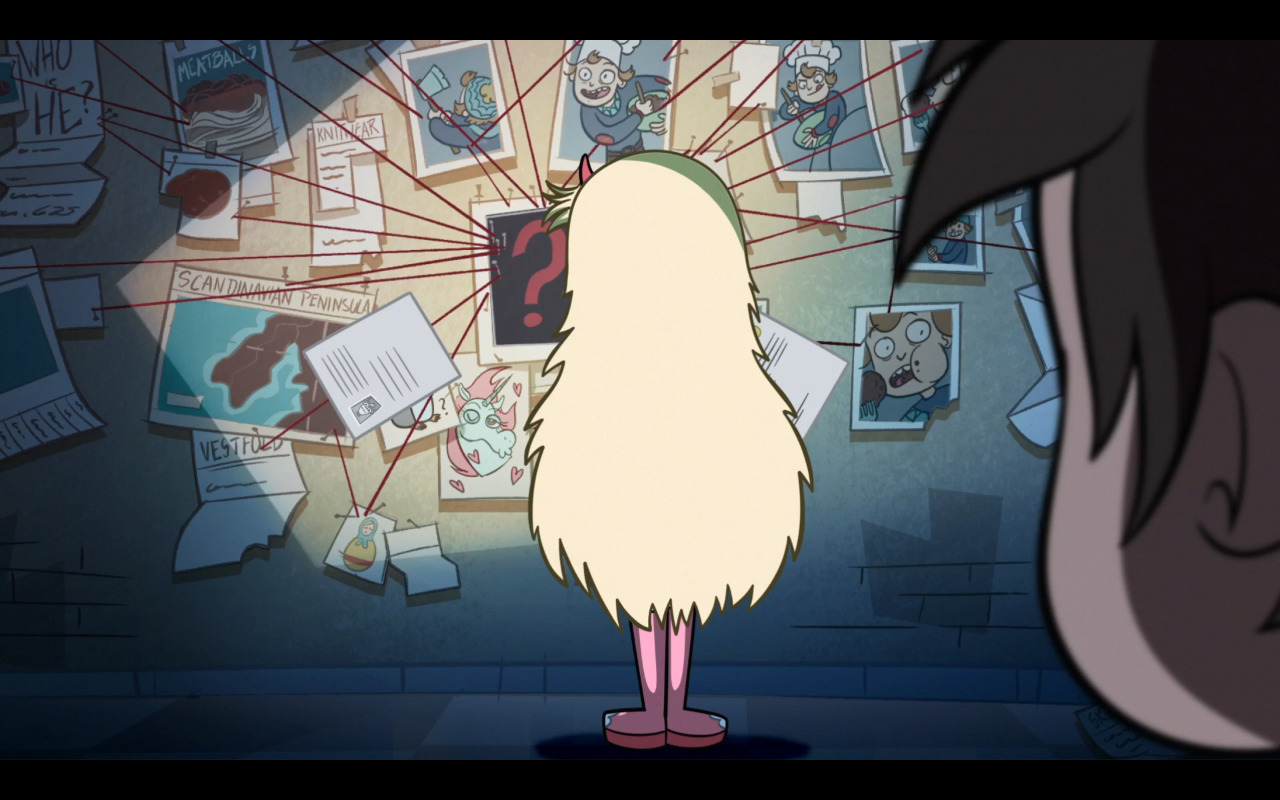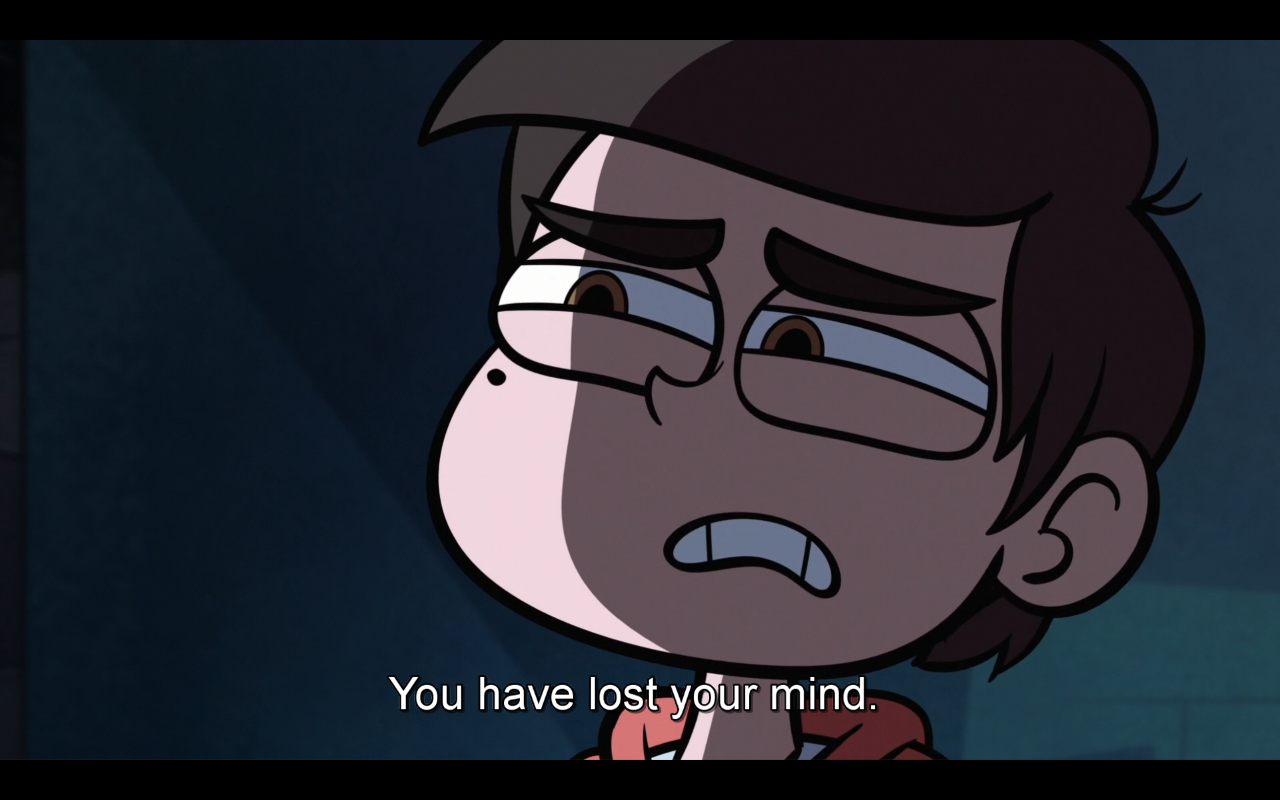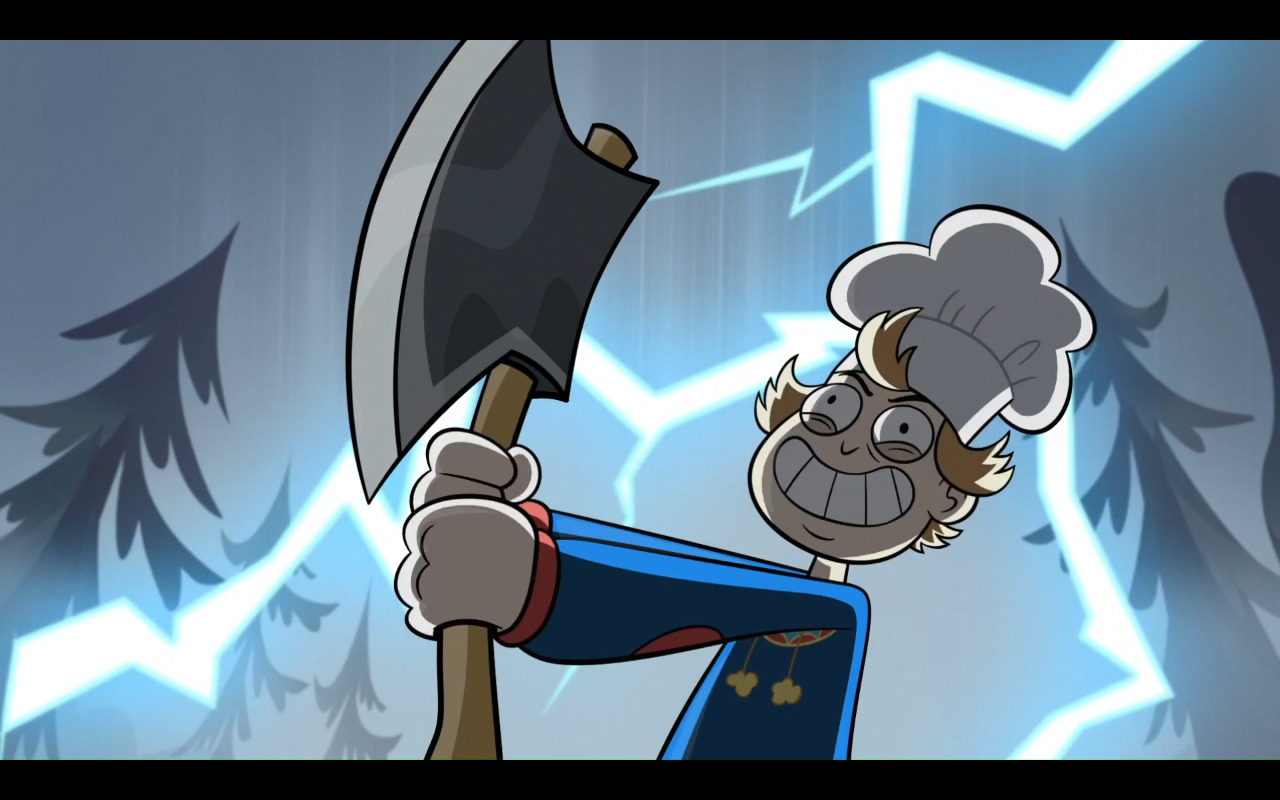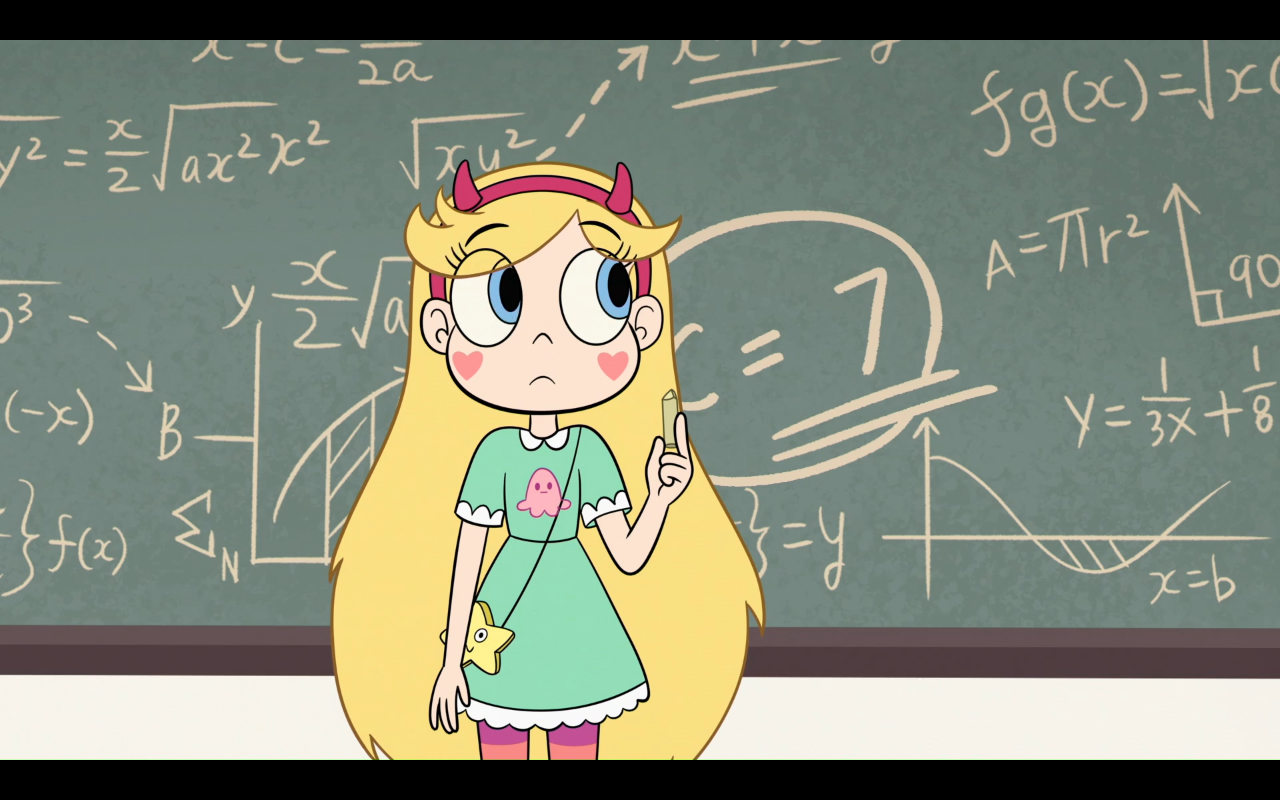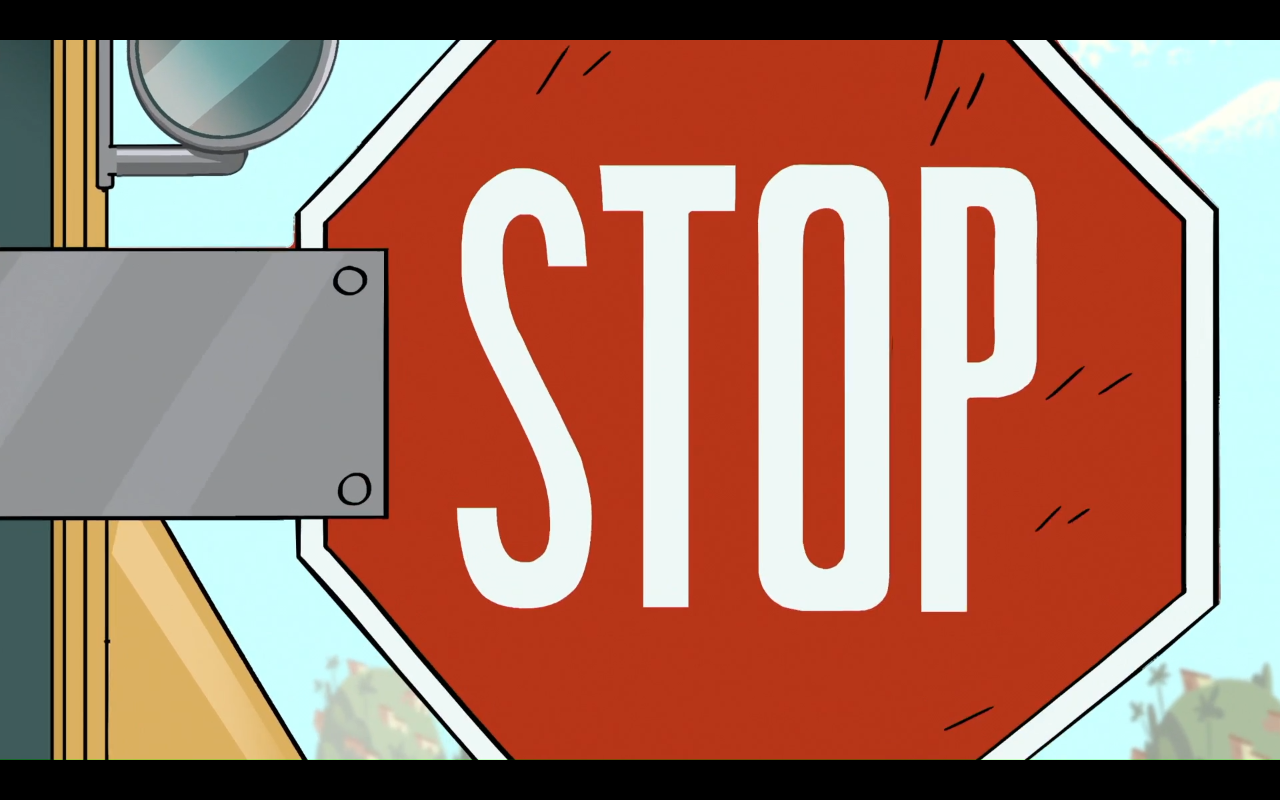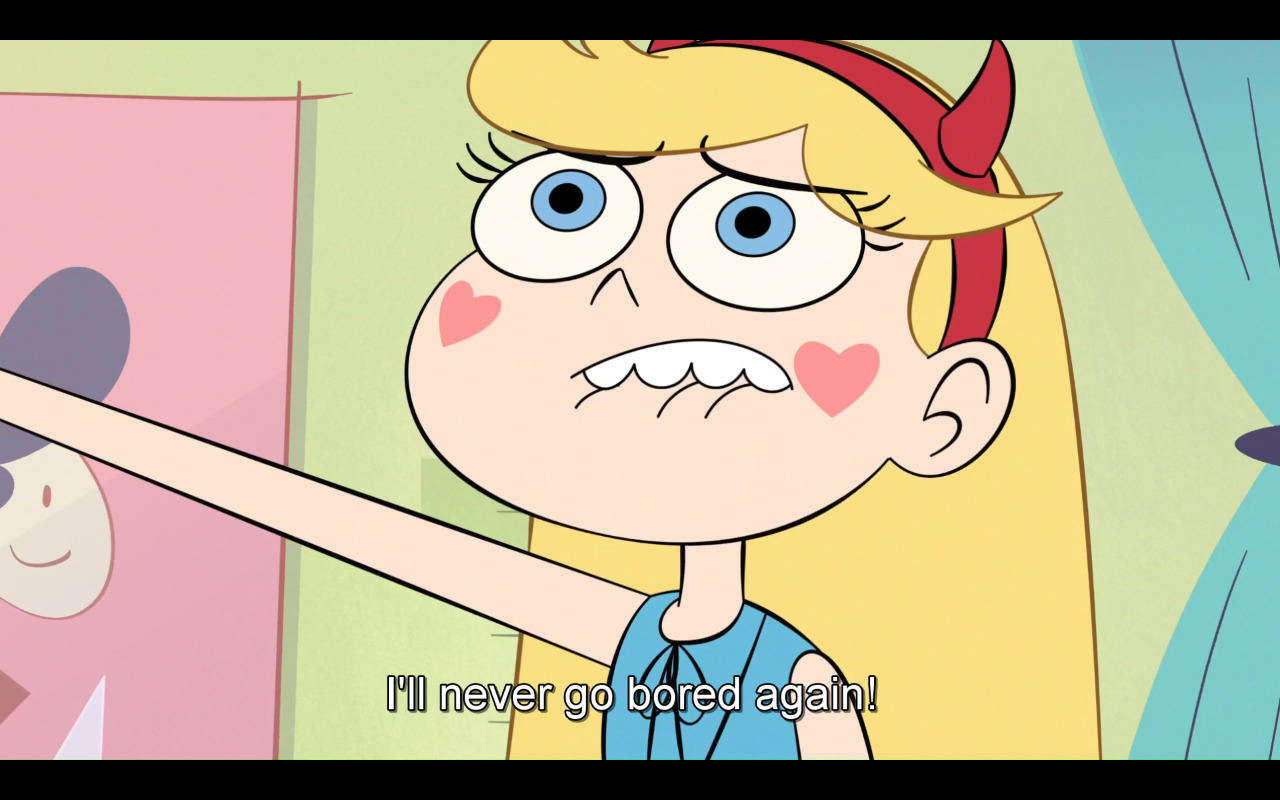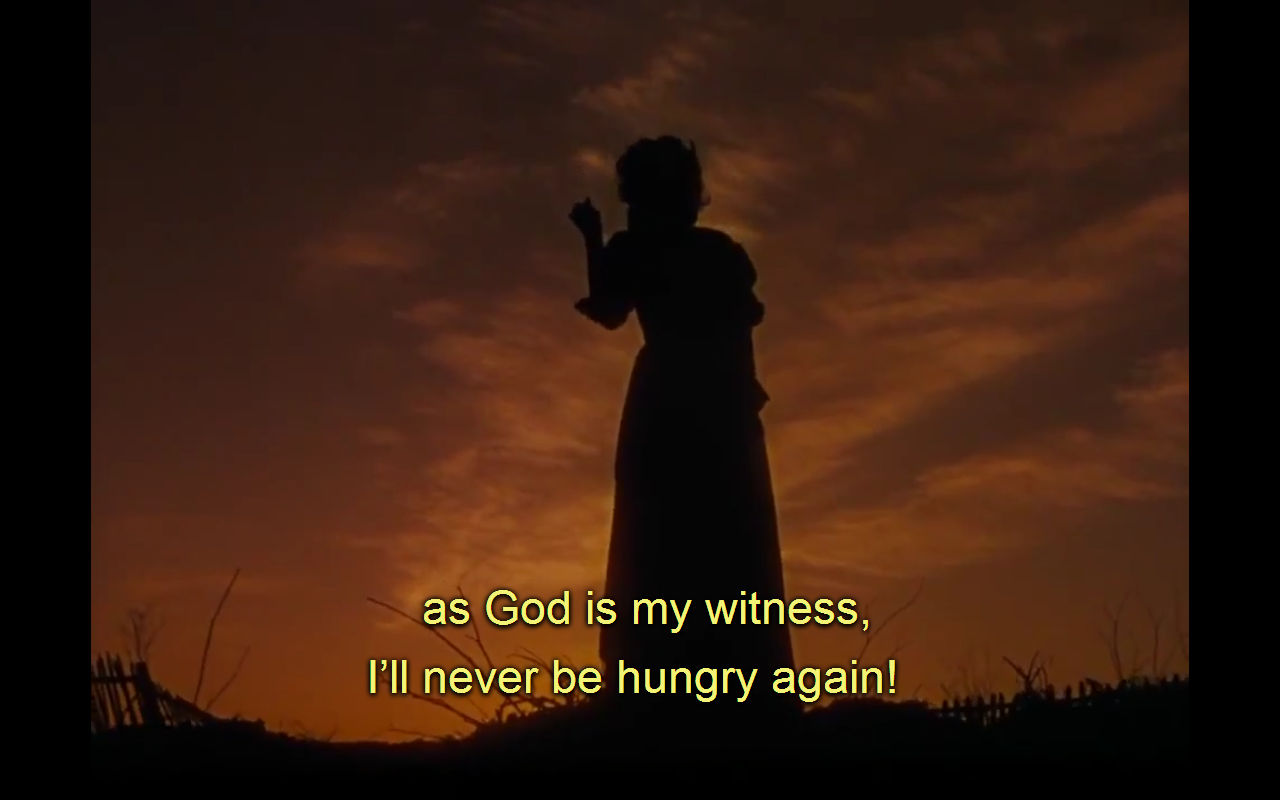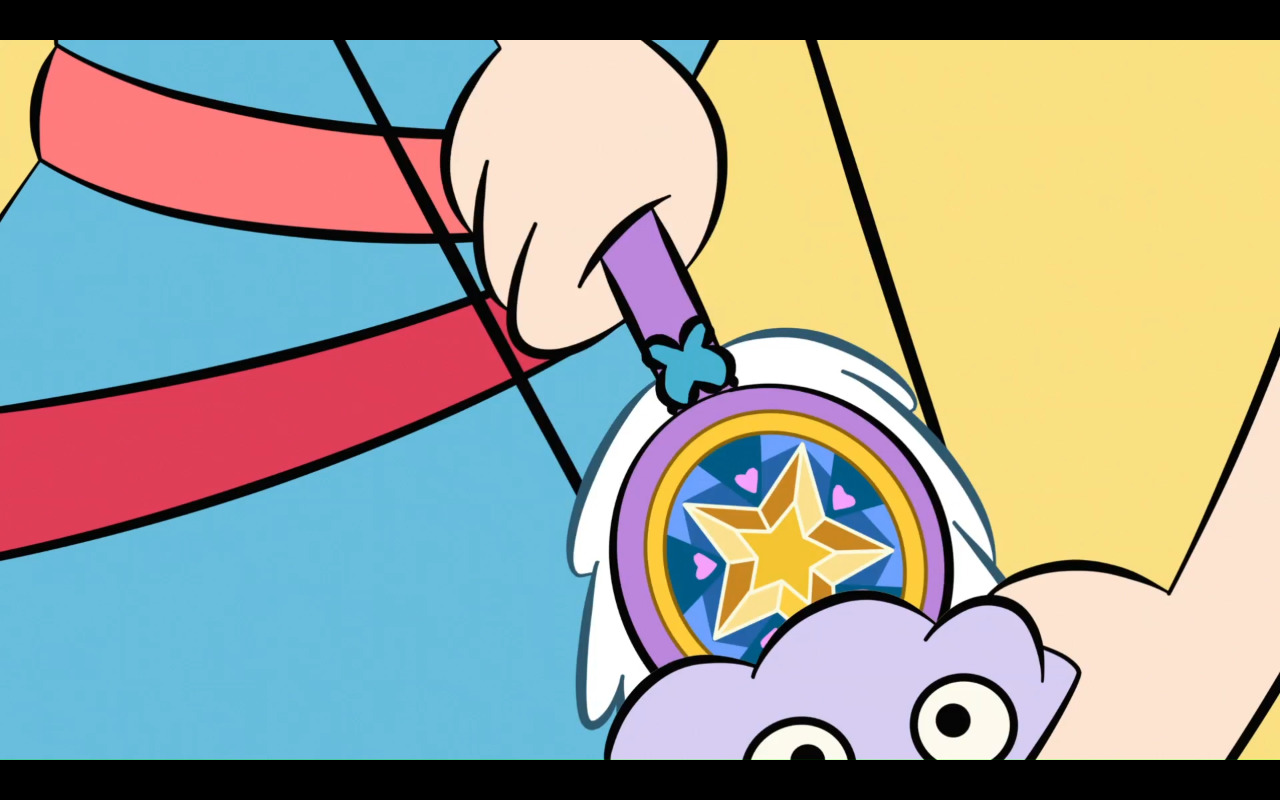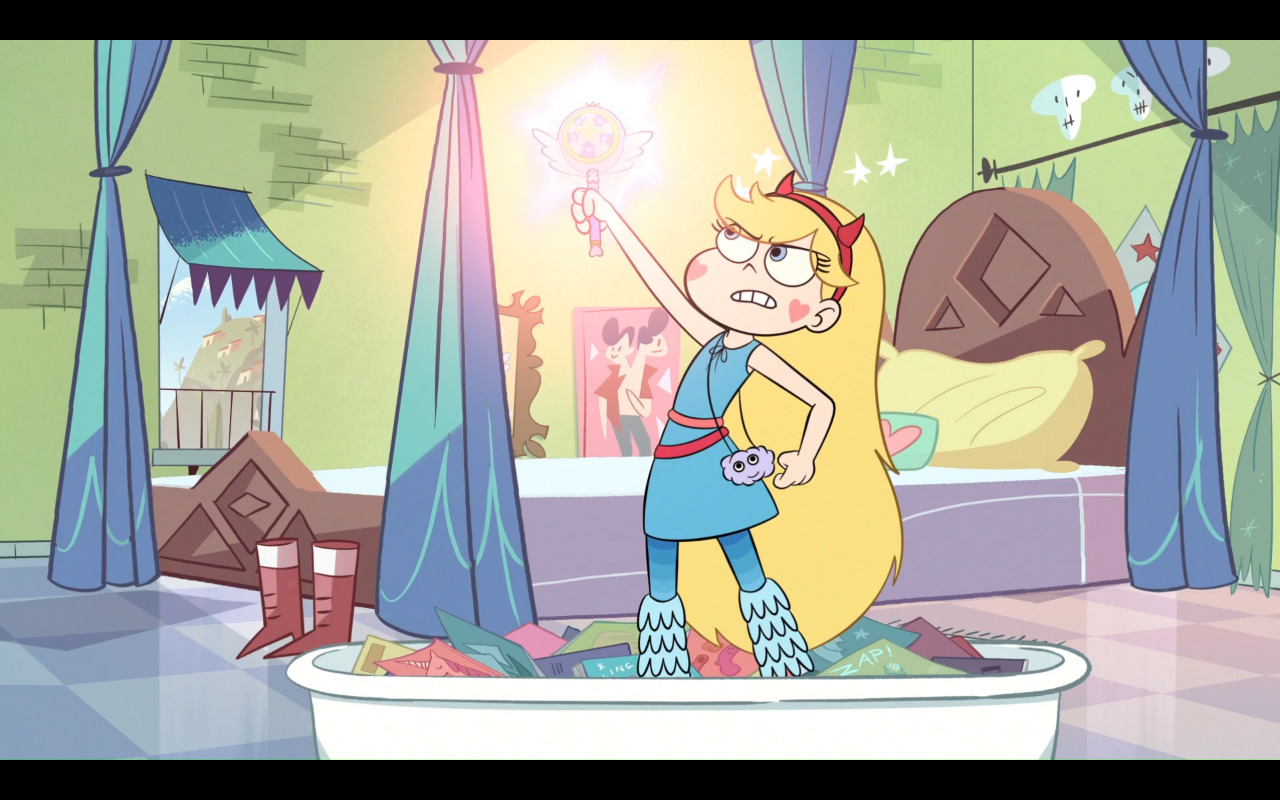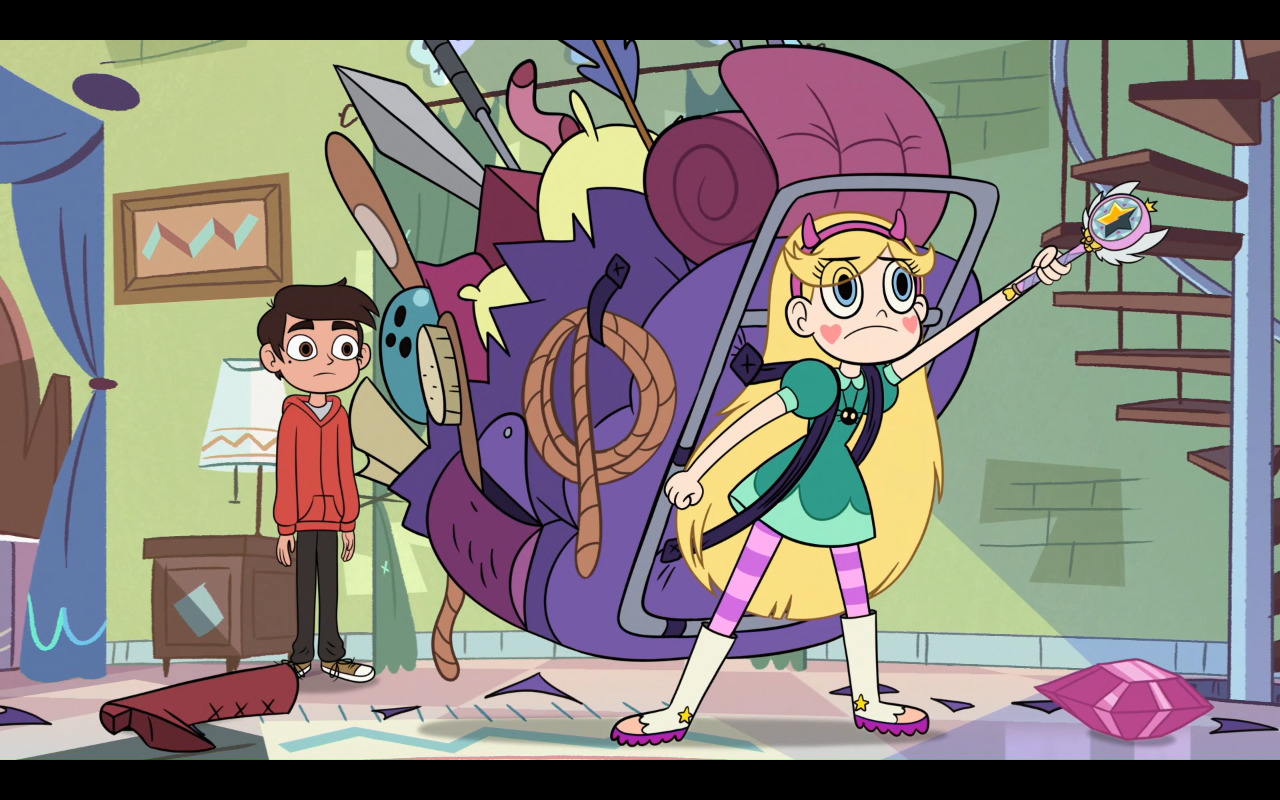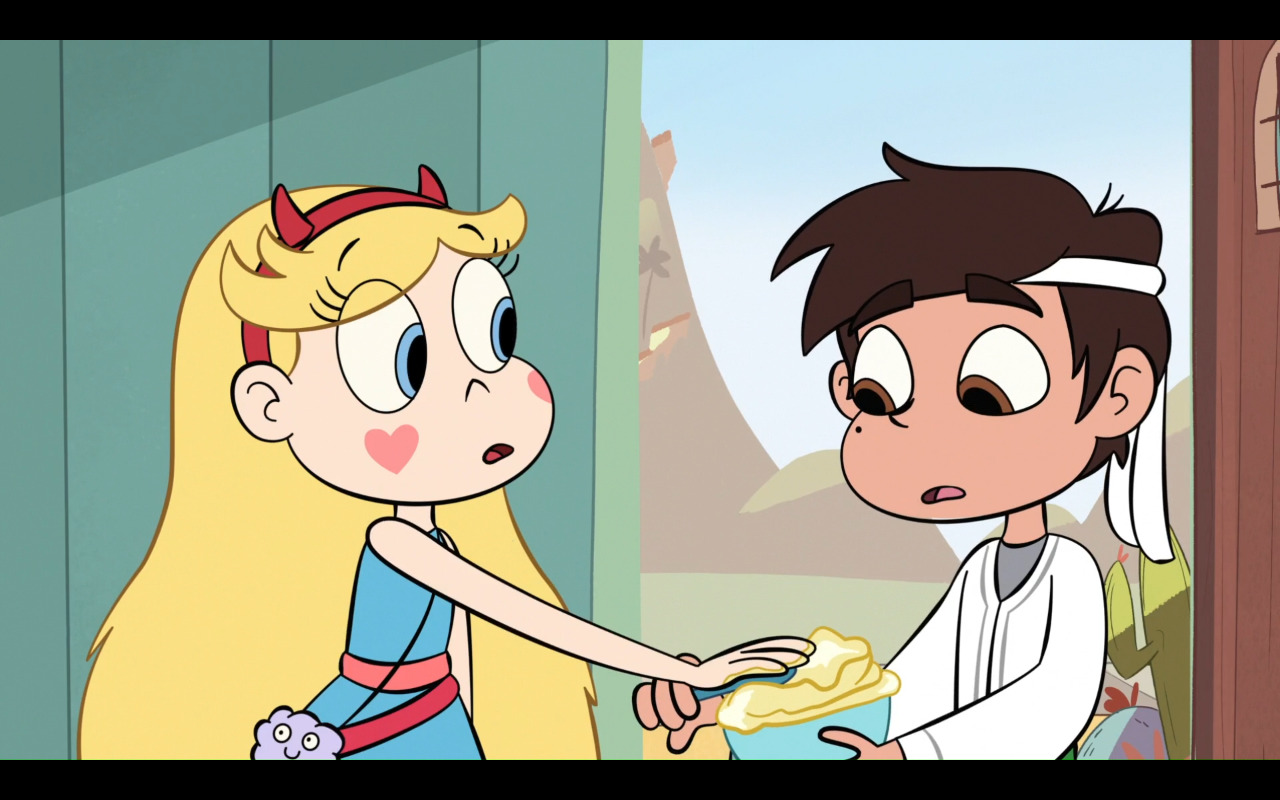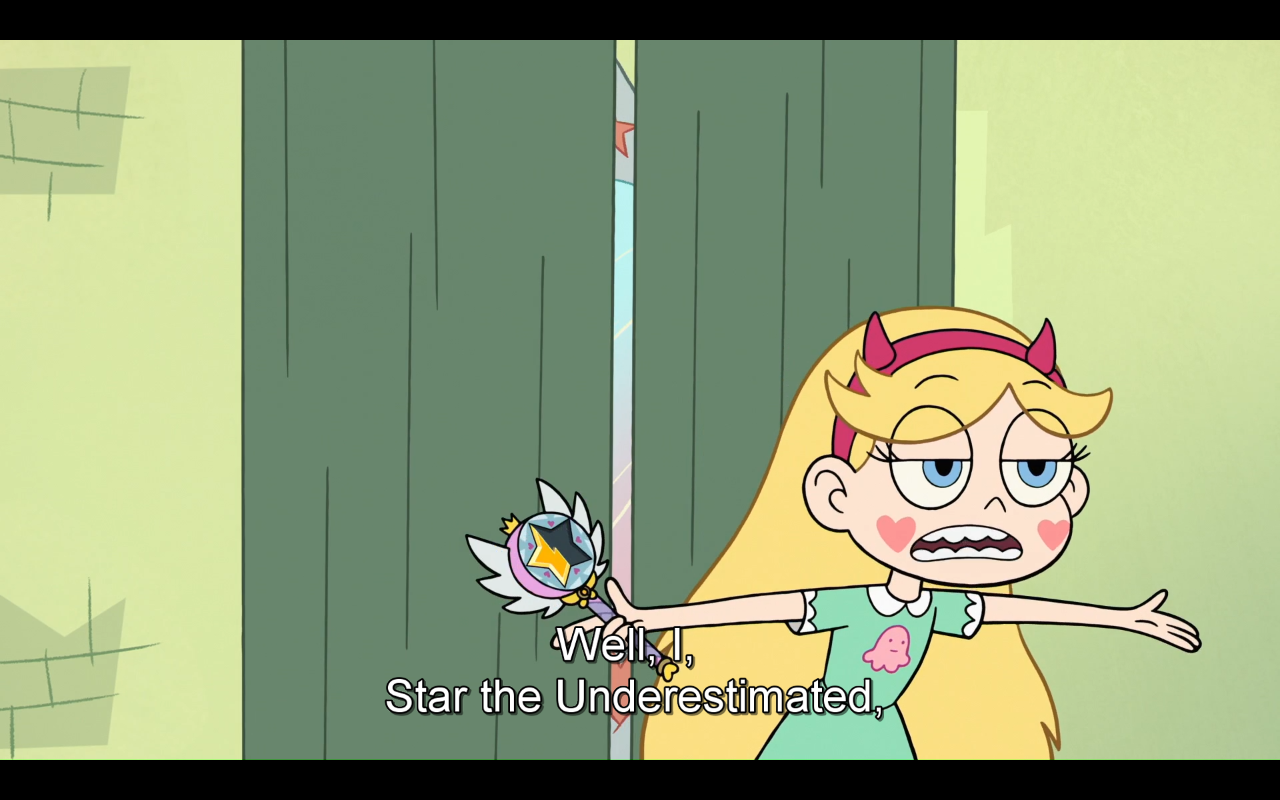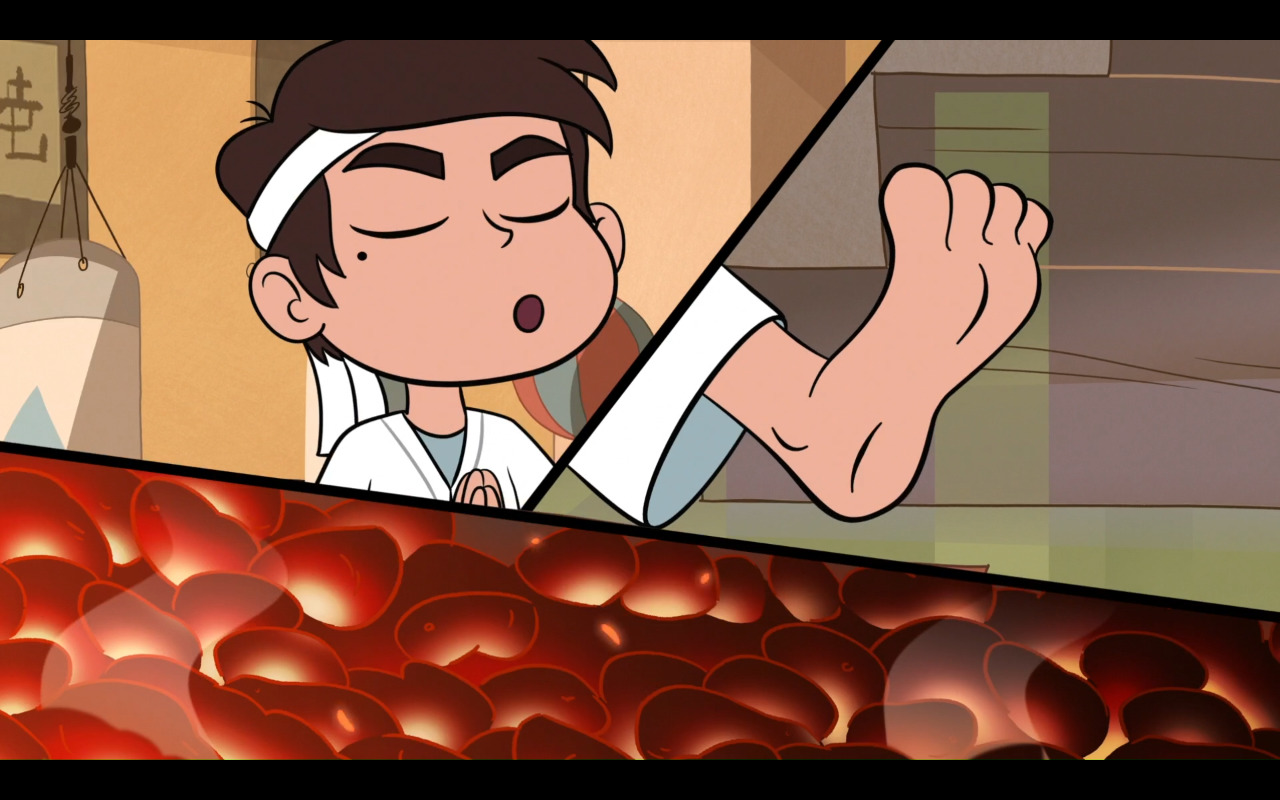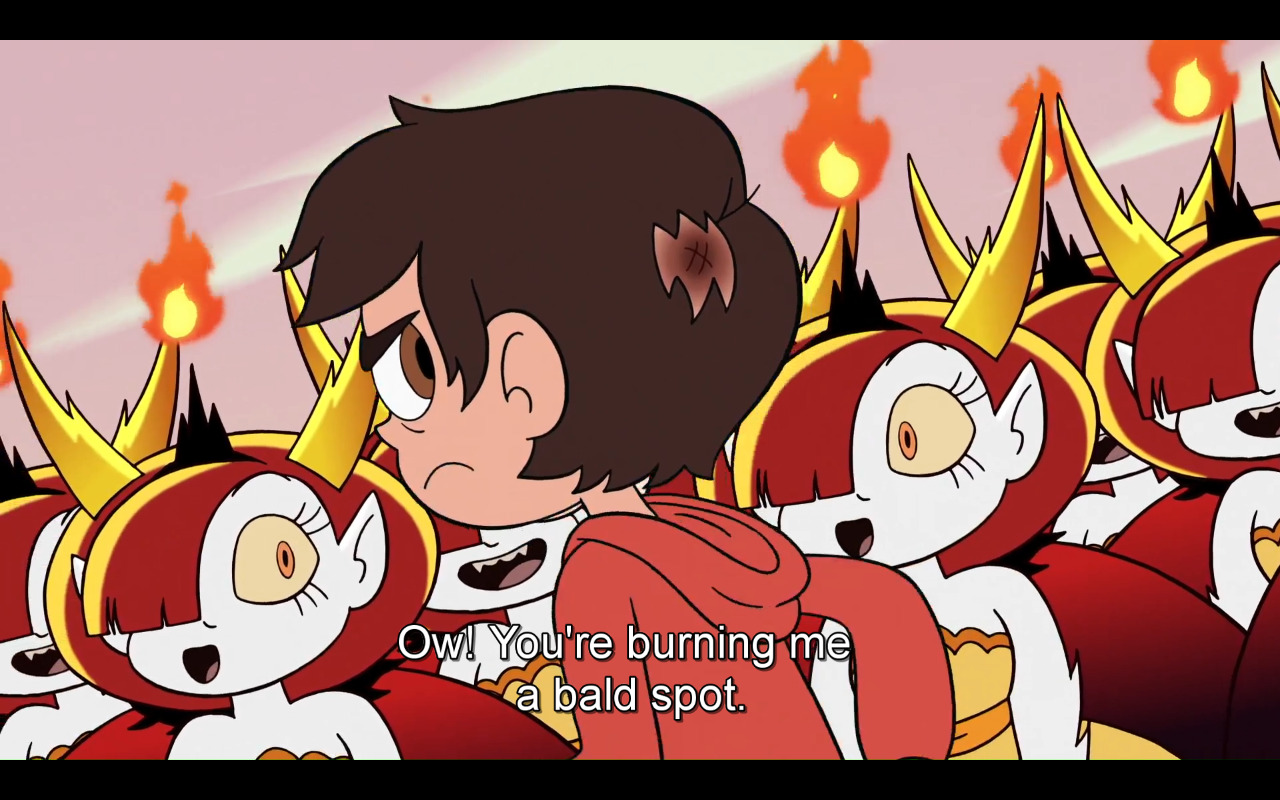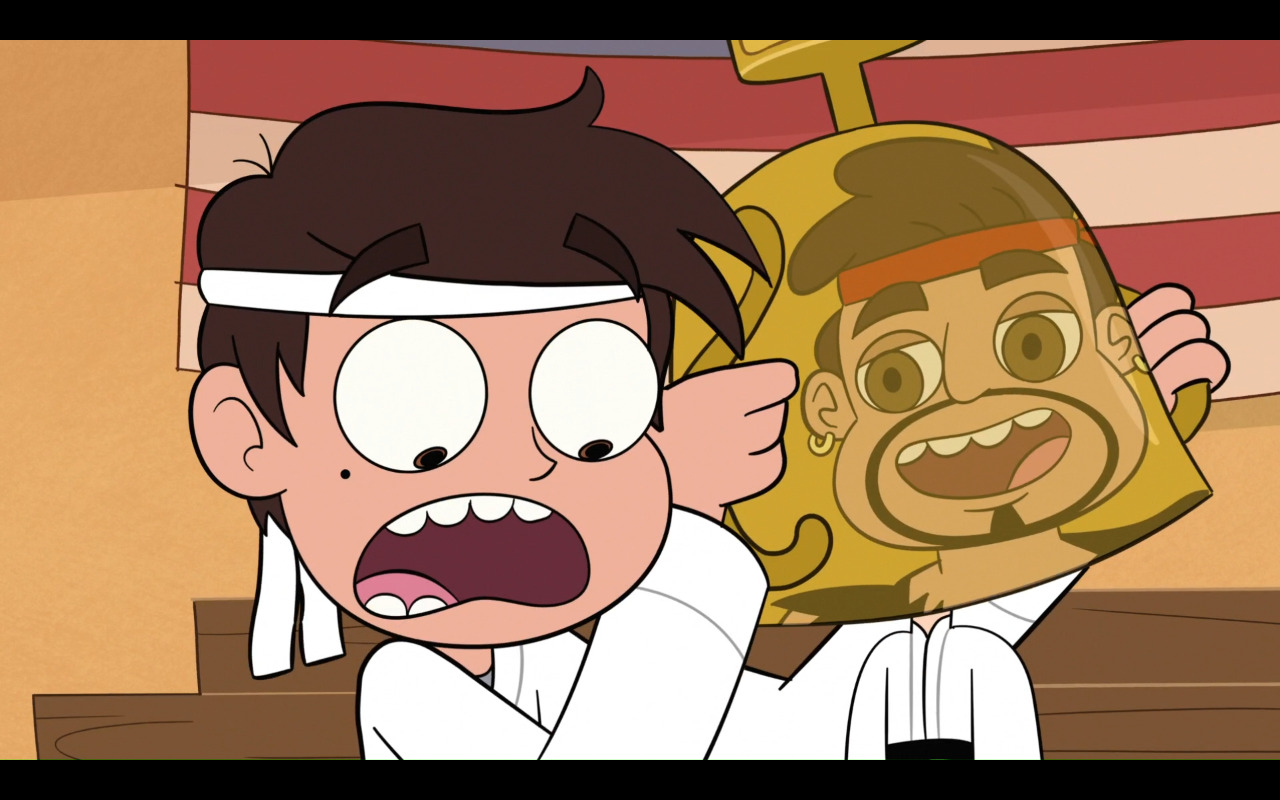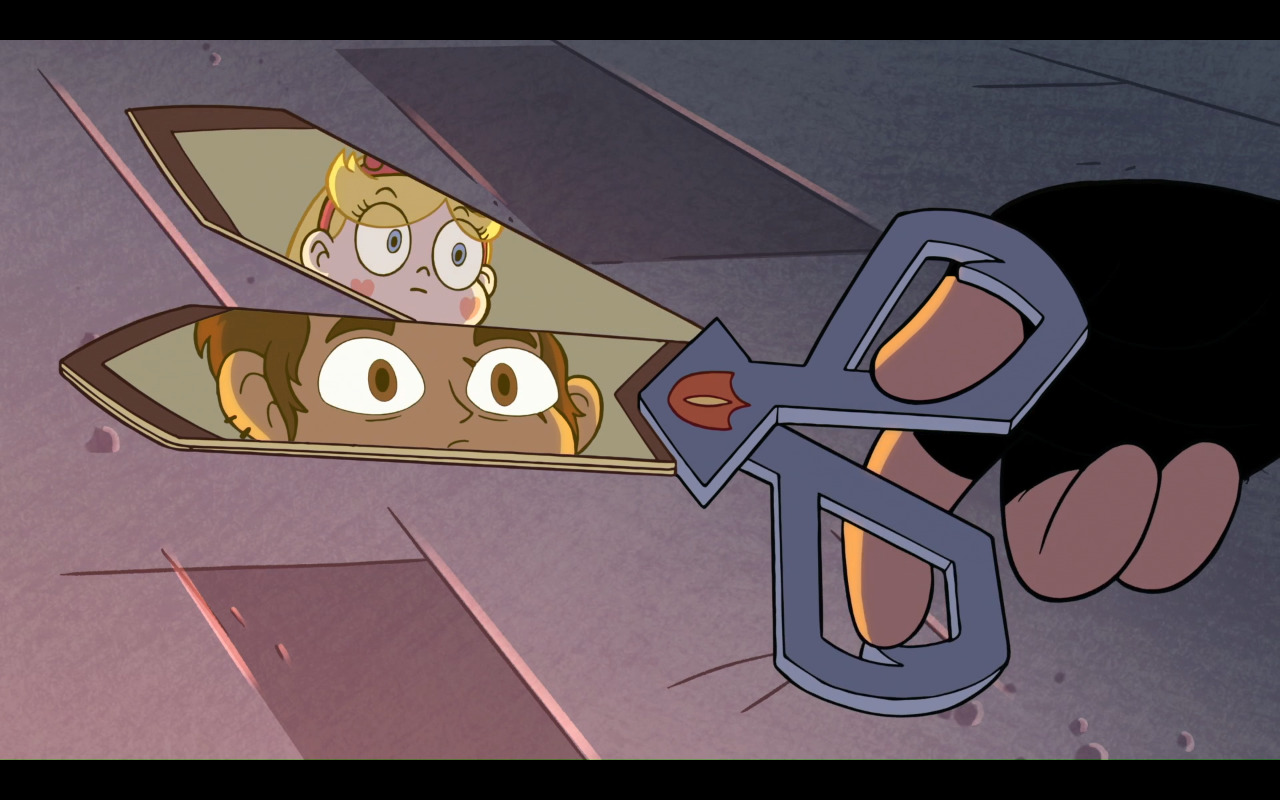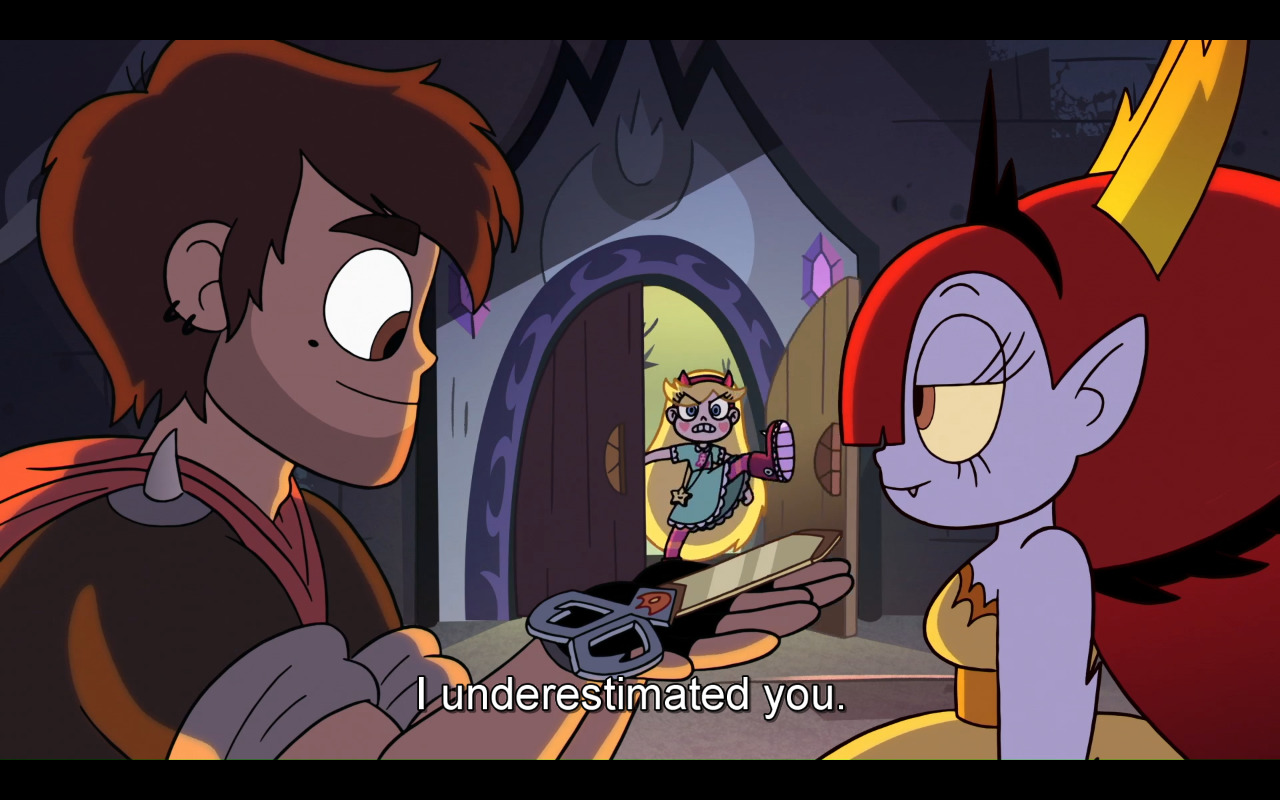The death of the self: the deep-rooted, long-running fear of identity loss in Star vs. the Forces of Evil.
Hello, there. It’s been far too long since I’ve written a lengthy analysis like this, but it’s my pleasure to bring it to you at long last. Originally, this was going to be a Double Take post on the episode “Fetch”, but, in the end, I decided that this topic was so crucial to thematically understanding the series as a whole that it deserved its own individual post. So here we are.
I will still talk a great deal about “Fetch”, as I feel it is what I have begun to think of as a “Rosetta Stone episode” – an idea which I will elaborate on later – but this post will mainly draw upon examples scattered throughout the entire series, from the first episode up to the most recent one as of this writing, “Butterfly Trap”. As such, this post will have some spoilers.
My intention with this analysis is to draw a straight line through the entire series – not only to show you the many forms that the series uses to continually confront us with the idea of identity loss but also to discuss the far-reaching implications that identity loss may have in future episodes. I’ll also talk briefly about the philosophy that drives the show’s conception of identity loss.
Though several characters betray a fear of losing their identity, in the interest of time, I am going to focus solely on Star and her fear of losing her sense of self – her identity.
One more warning before we start: this analysis will include a brief, existentialist discussion of suicide. It is not an easy topic to read about – nor write about, for that matter – but I would be remiss if I did not tackle the philosophy behind the theme. If the discussion of it disturbs you, you may wish to skip this post.
This post will be a long one. Read on for more.
Obligatory Rambling Introduction
Before I begin with the real meat of this analysis, I’d like to say that many of you watching Star vs. the Forces of Evil have already pinpointed – correctly, in my estimation – Star as having an identity crisis as a result of the recent revelation in “Butterfly Trap” that she is not descended from Eclipsa.
This identity crisis, however, did not start there. It has, as a matter of fact, been building in the background the entire time – ever since, I argue, the very beginning of the show. Star has always been afraid of losing her identity – of not knowing who she is, and everything she does, from fighting monsters to revealing all her secrets to the public, is done, unconsciously, to fight that fear.
You know, in a way, it’s funny that this topic came up at the time that it did. I just got done watching a newly-posted YouTube video about Neon Genesis Evangelion and philosophy (which I will not link, because I can’t recommend it; sorry) – not to mention I’m always thinking of Evangelion – and I would go so far as to say that no other animated work ever is as concerned with the nature of human existence – with its soul-crushing loneliness, its bitter limits of consciousness, its utterly anguished depths – as Evangelion is:
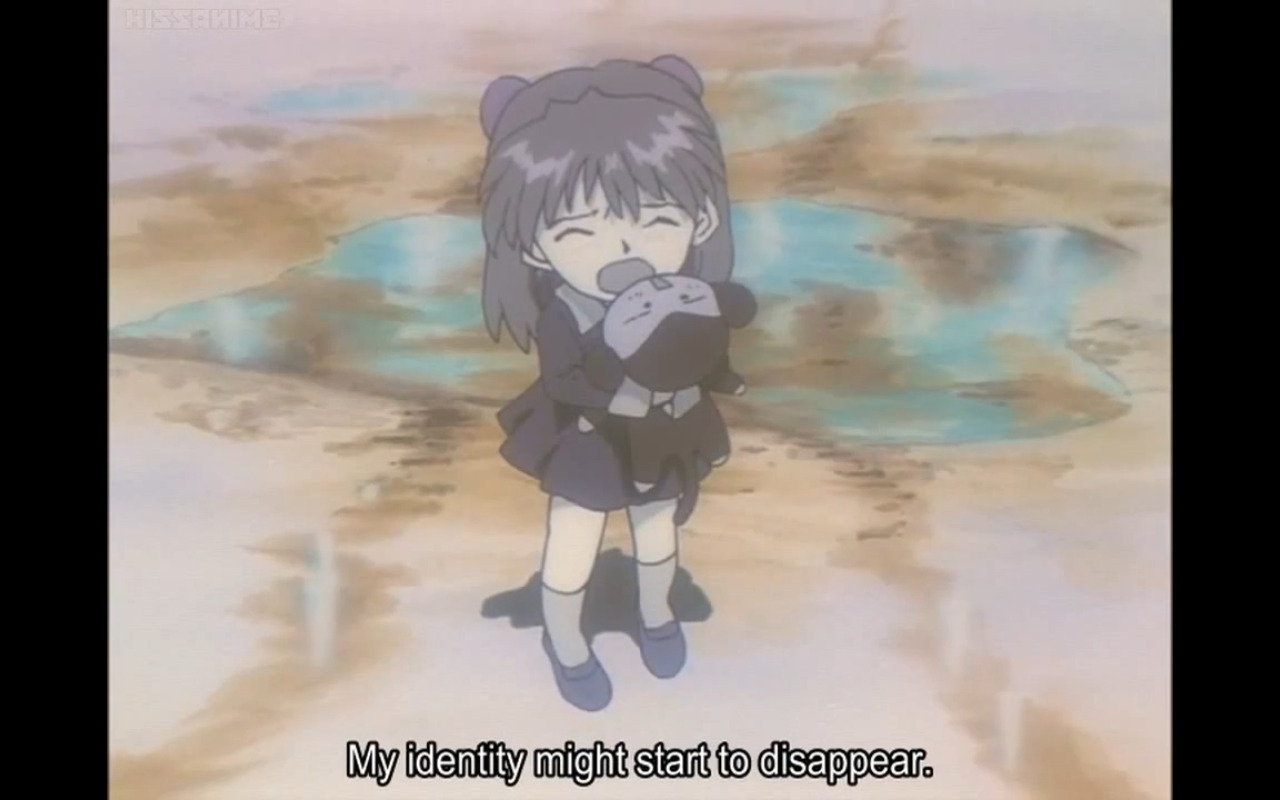
Poor Asuka.
Plus, I’ve been watching The Good Place, which I recommend. It’s hilarious and thought-provoking at the same time! So I really think I’m in the perfect frame of mind to tackle these weighty issues in Star vs. the Forces of Evil, you know?
Anyway.
Who Are You?
When I say that Star vs. the Forces of Evil is concerned about identity from the very beginning, I mean the very beginning: as soon as the theme song starts. For what is the very first thing we learn about Star when we watch the first episode?
I ain’t from ‘round here; I’m from another dimension!
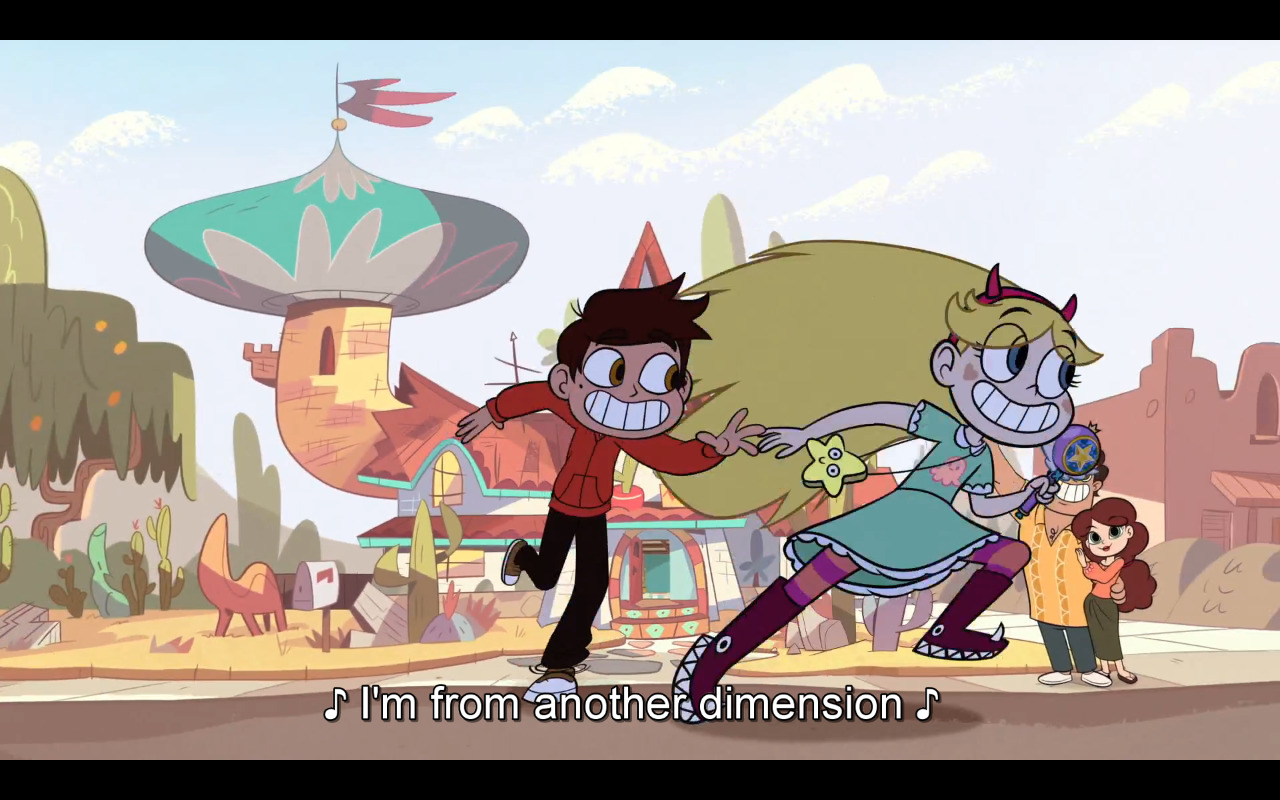
But before we can begin to talk about an identity crisis or a loss of identity, we should first establish what, precisely, constitutes an identity. What do we mean when we talk about our identity? How do we identify ourselves? The way the show gets us to think about these things is to pose a serious question at crucial moments – a central question which is repeated throughout the series and first asked in “Star Comes to Earth”:
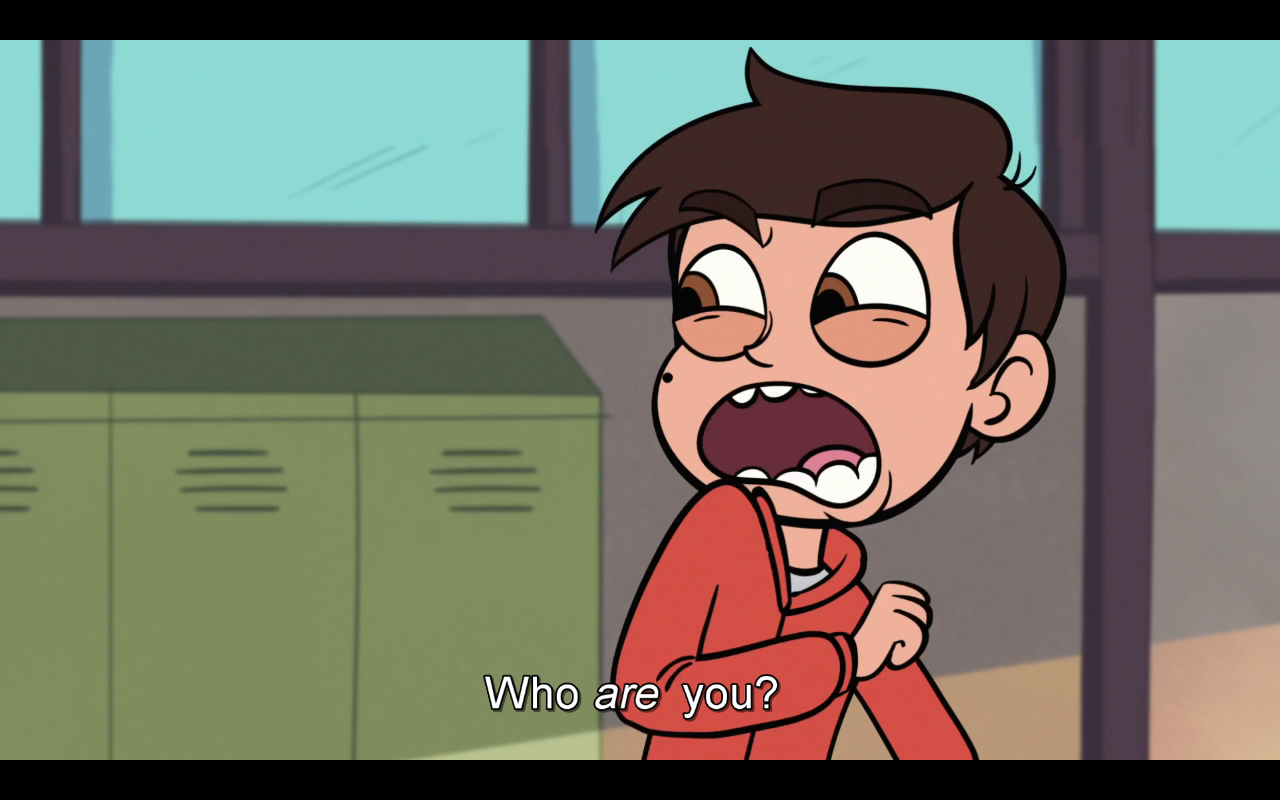
And, of course, Star’s famous response:
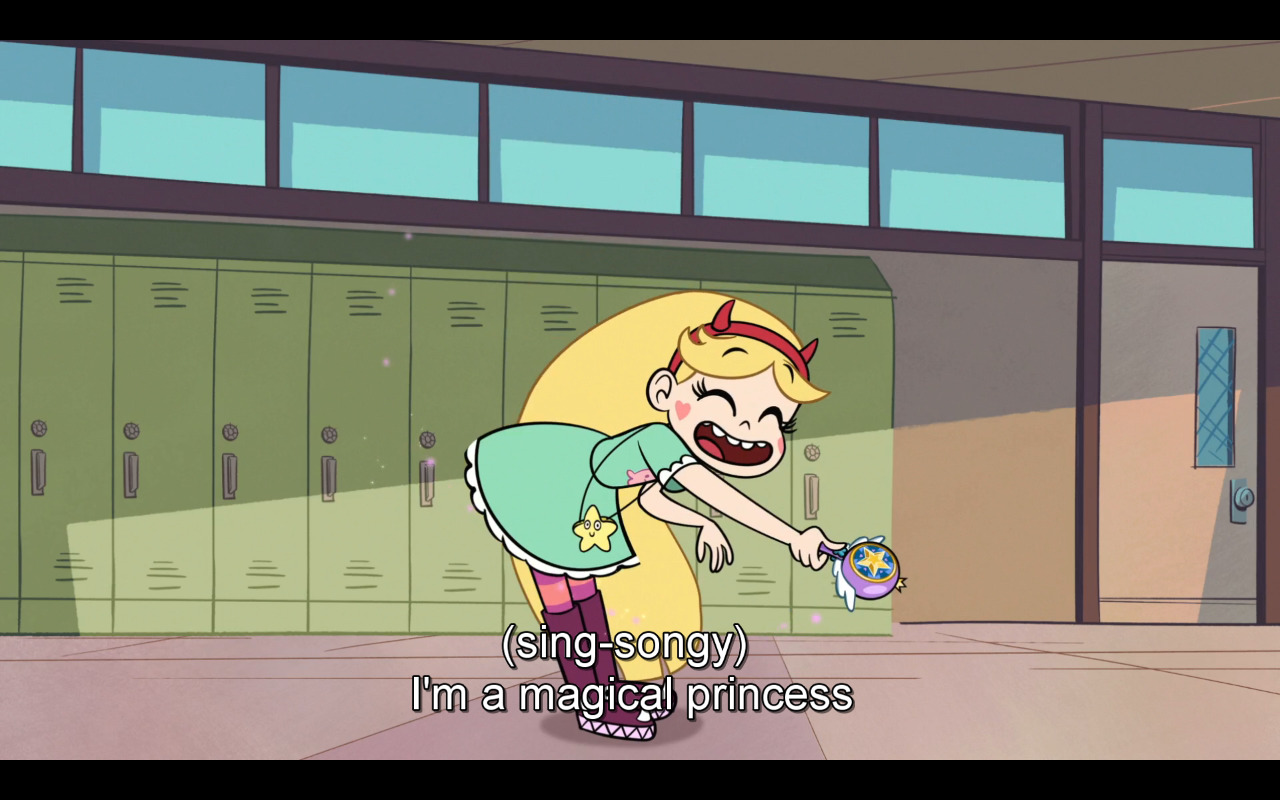
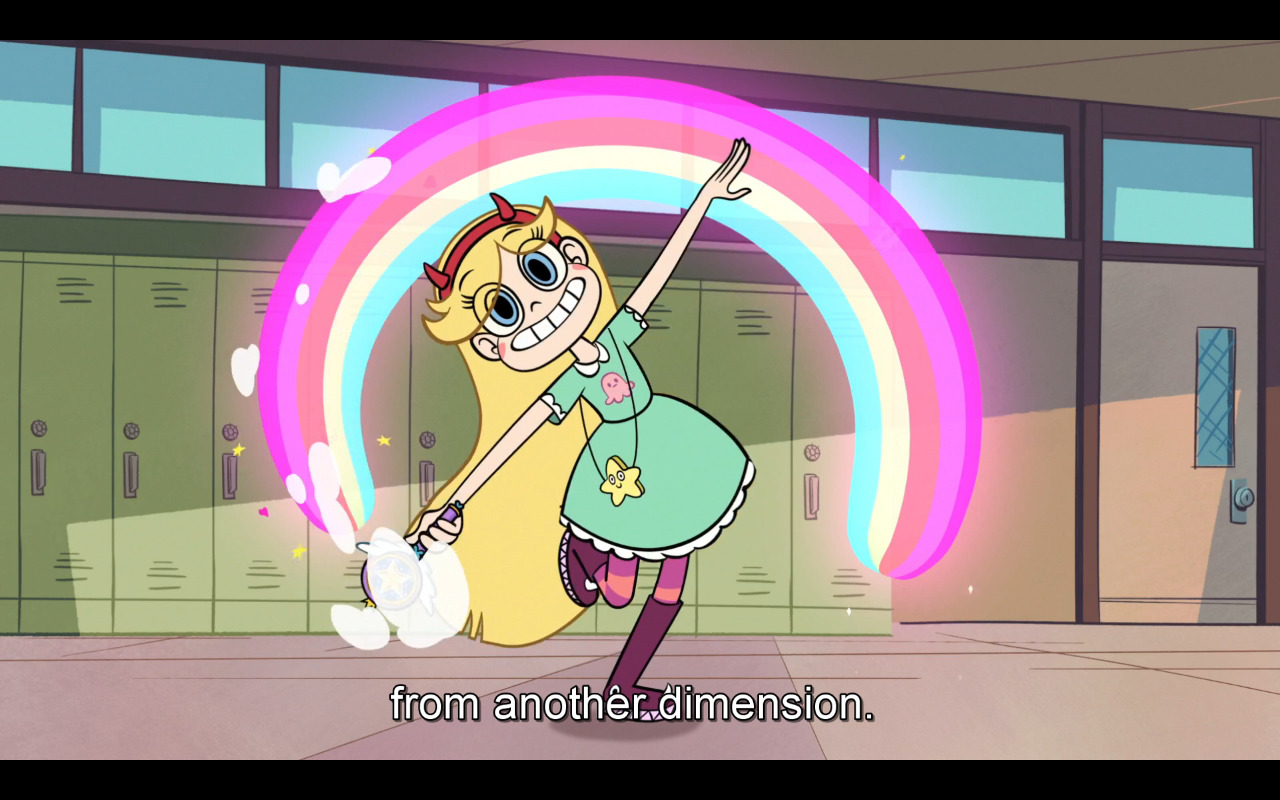
But let’s parse Star’s answer for a bit.
Star first identifies herself as a magical princess. Now – given what we’re presented with in “Star Comes to Earth”, it’s pretty hard to argue that she isn’t a magical princess: she has a wand and can perform magic, of course, and is the daughter of royalty. It all seems cut-and-dried.
Interestingly, Star also identifies herself as being “from another dimension”; indeed, as I noted earlier, the theme song itself reinforces this notion of Star being “from another dimension”. You could argue, perhaps, that it’s reasonable for Star to introduce herself that way, since Earthlings aren’t even generally aware that there are other dimensions.
On the other hand, I think it’s notable that Star immediately re-contextualizes her identity in terms of where she is currently at instead of who she thinks she is; that is, she doesn’t say, “I’m a magical princess from the land of Mewni” – she says, essentially, “I’m a magical princess, and I’m not from Earth.” But why does it matter that Star instantly identifies as someone who’s from somewhere else? Simple: it reveals that Star is already unconsciously thinking of herself as an “other” – that is, an outsider. Someone who doesn’t belong.
It’s also telling that Star defines herself in terms that are highly mutable. The very next episode is, of course, “Party with a Pony”, in which Pony Head gives Star a pair of Dimensional Scissors:
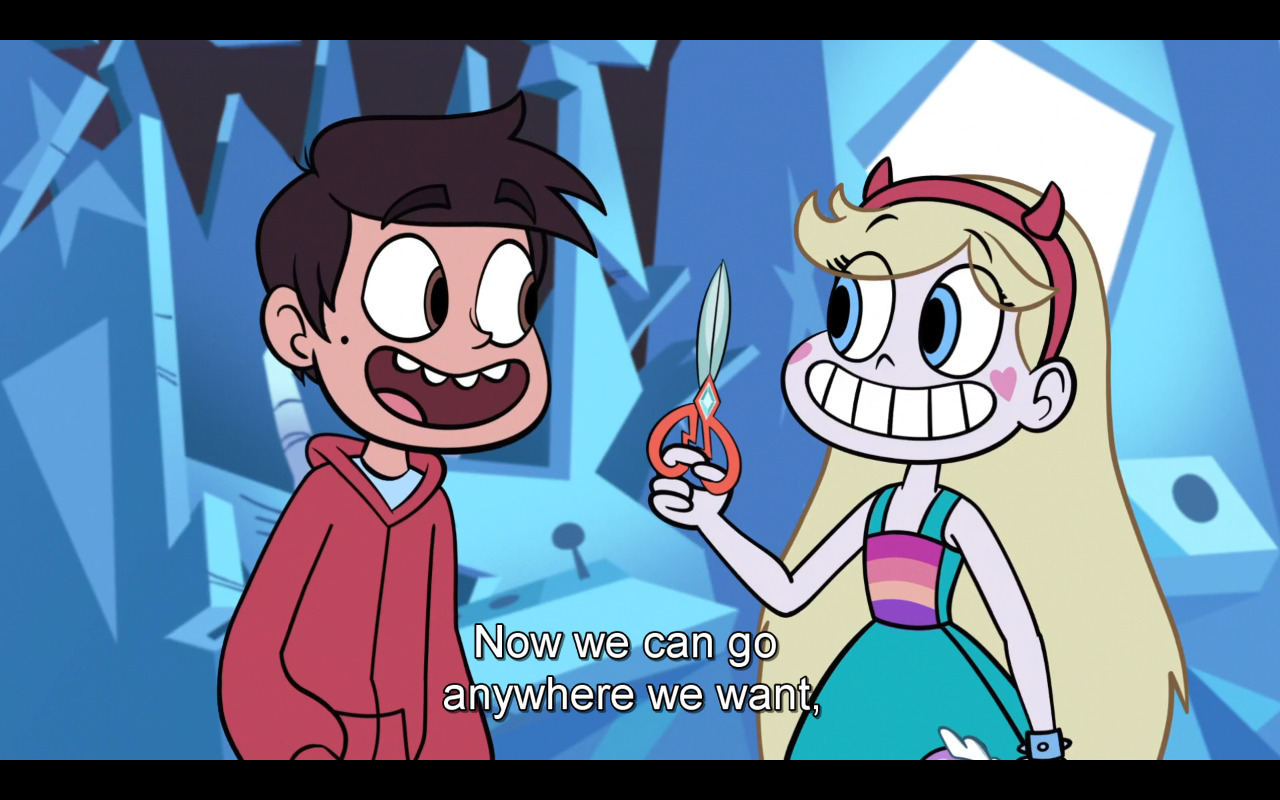
I think it’s strange to refer to yourself as being “from another dimension” in a universe in which people – including Star, now – have the ability to travel from dimension to dimension at will; it doesn’t seem like a very useful way of identifying yourself.
Thus, even from the beginning, Star’s way of identifying herself rests on a shaky foundation; even the first season with all its attendant silliness explores the fragile way Star conceptualizes herself, toying with our notions of who and what Star is – and it only gets worse as the series progresses. Star doesn’t understand who she is, and we are later reminded of her potential loss of it at any moment:
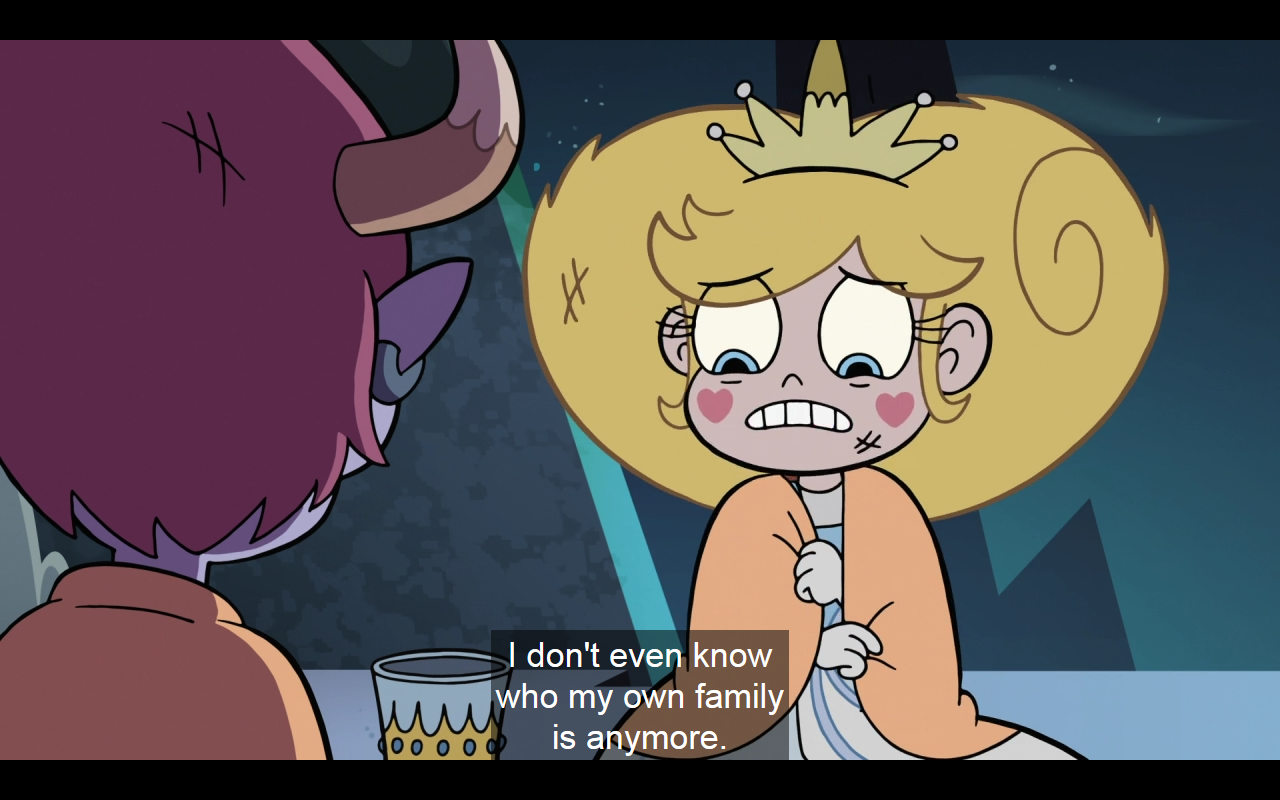
Star’s conception of herself – her identity – suffers blow after blow throughout the series. Just look at these episodes through Star’s perspective:
- "Matchmaker”: I’m not good at magic or matchmaking.
- “School Spirit”: I really am a screw-up.
- “Pixtopia”: I use my own name as a pejorative verb.
- “Lobster Claws”: I might be wrong about monsters being evil.
- “Sleep Spells”: I have mother issues … and those are bad.
- “Mewnipendance Day”: Maybe my kingdom was actually oppressive and cruel.
- “The Banagic Incident”: My best friend underestimates me.
- “Marco Grows a Beard”: I can’t do anything without my wand.
- “Storm the Castle”: Magic is dangerous, and I can’t always beat the bad guys.
That’s just in the first season alone. (And I’m sure I missed some!) The series uses each of these incidents as a way to confront us about the meaning of identity, to remind us that it is malleable, and to intensify the emotional stakes behind Star’s development by showing that even she is, to borrow a line from a later season, “in a constant state of falling apart.”
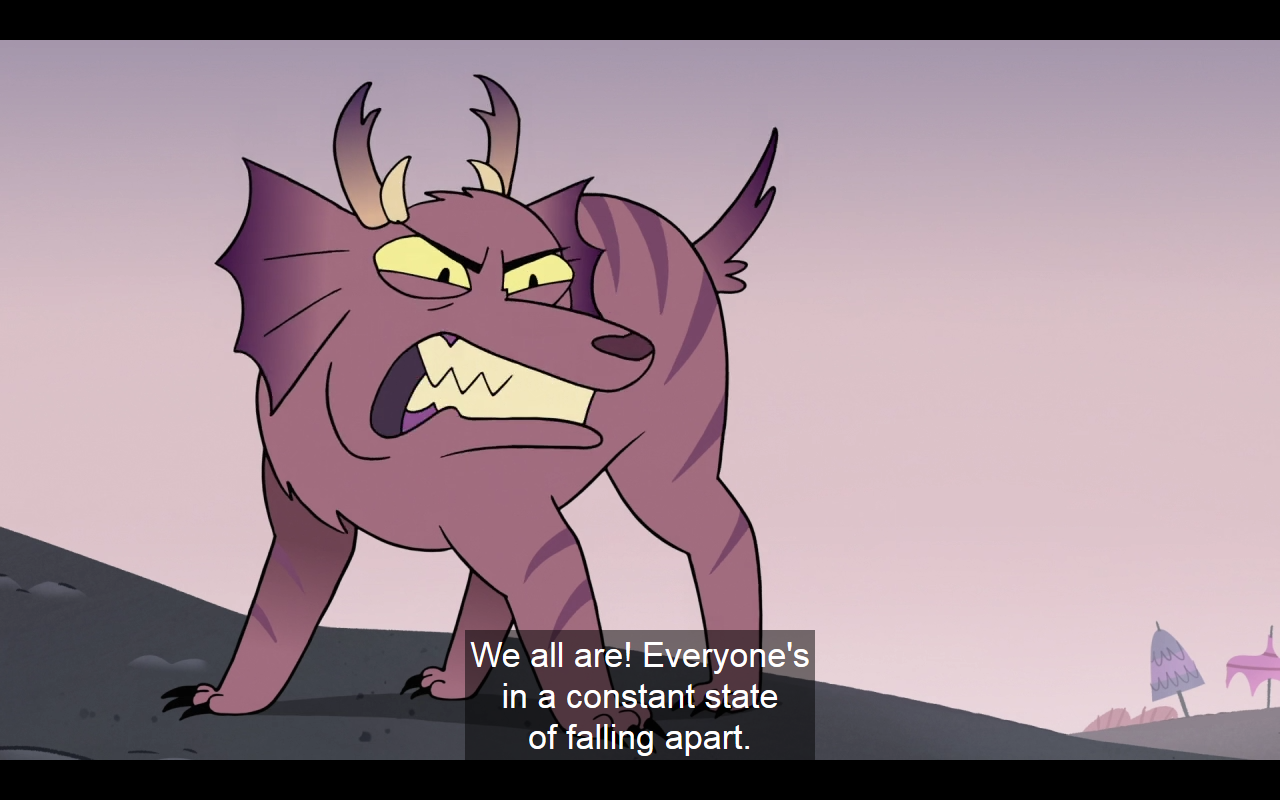
Moreover, Star is terrified of losing what identity she has; Star suspects what happens at St. Olga’s Reform School for Wayward Princesses, and she consistently expresses her fear of being sent there, even from the very first episode:
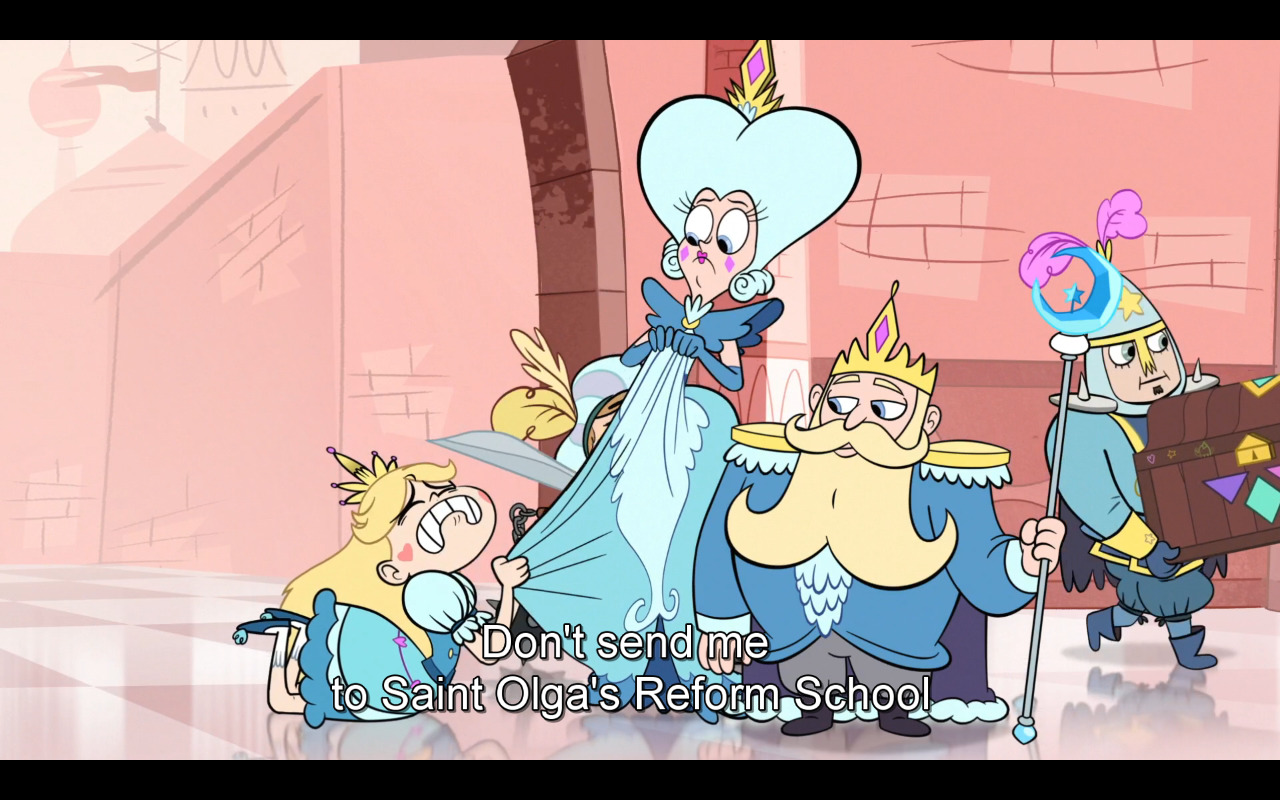
The reason Star is so afraid of losing her identity is, I think, because she is unconsciously aware of how fragile her identity is – how close she is to losing it when the next unpleasant truth is revealed. But we’ll talk more about St. Olga’s later.
Recall the phrase that I said was one of the central questions in Star vs. the Forces of Evil: “Who are you?” The next time we hear the question asked, believe it or not, is in “Fetch”.
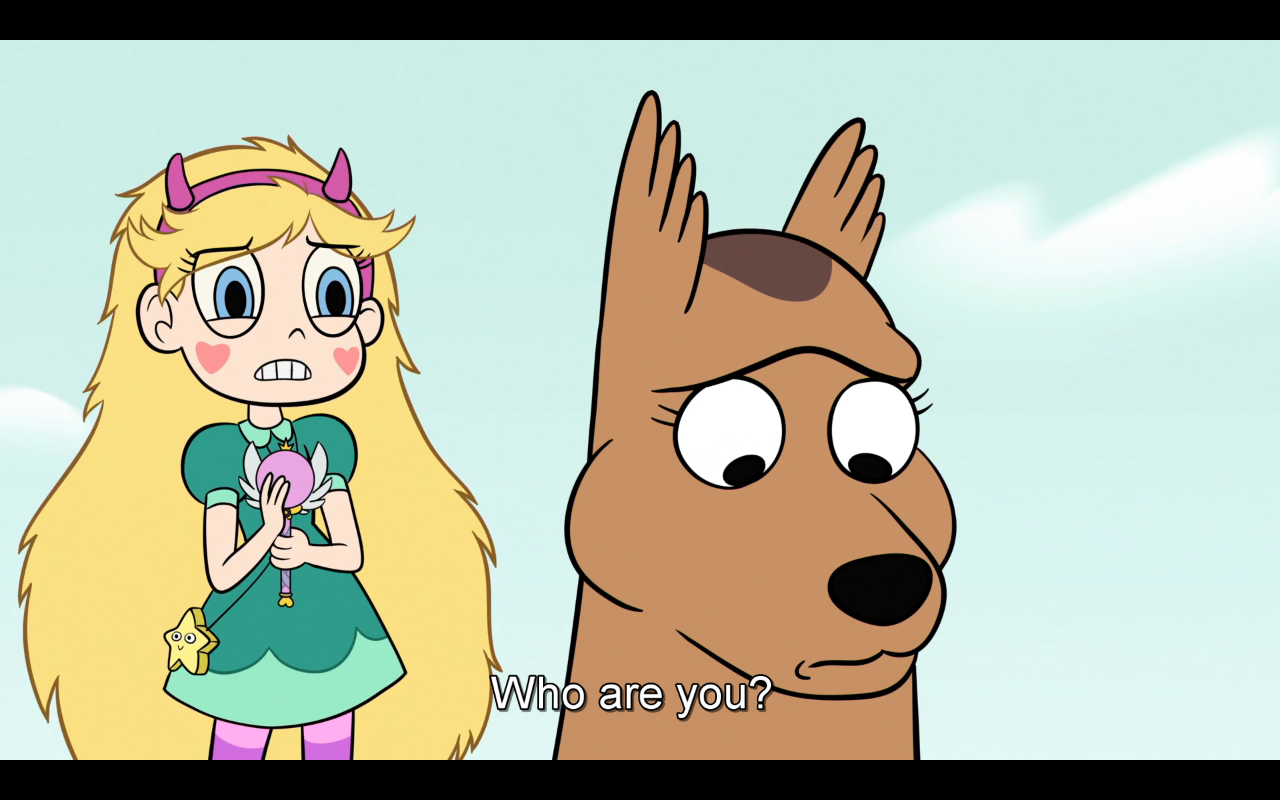
But Why “Fetch”?
“Fetch” doesn’t get enough credit. Sure, it’s a weird episode. Sure, seemingly nothing happens in it – and, sure, it’s no exaggeration to say that, for most fans, it’s probably the single most disliked episode of season two. Honestly, I also disliked it when I first watched it. But you know what? When I watched it again on my second time through the series, I began to notice some patterns in the episode – patterns that reflect the broader theme of fear of identity loss in the series.
You see, "Fetch” is an episode that is very much concerned with identity. It’s because of “Fetch” that I realized there even was a related overarching theme in the series. Thus, I think of “Fetch” as a kind of Rosetta Stone: a guide to interpreting other episodes. By thinking critically about “Fetch” and its patterns, I was able to usefully examine other episodes using the rhetorical framework that “Fetch” provides. (I also think of its companion episode, “Star on Wheels”, as a Rosetta Stone episode as well – but that’s a post for another day.) Let me walk you through my thought process.
I realized that “Fetch” is an episode which contains many examples of misplaced or lost identity. Here’s a list of things I noticed:
- Star mistakes Willoughby for a gargoyle.
- "That’s a dog, not a coat.” “Fur coat.” “No.”
- Willoughby is a dog, not a hat, but Star wears her like a hat.
- “Sure, ignore me. It’s not like I’m a person with feelings. Or anything.”
- “Cool. Thanks, Joe!” “Name’s not Joe.” “And my name’s not Marco!”
- Lydia’s bizarrely vague lost dog poster.
- Willoughby is not the dog’s real name.
- The beautiful businessman is not Willoughby’s owner.
- Willoughby, who characters assumed was just a regular Earth dog, is actually from another dimension.
- The proper opening for the juice box doesn’t work, and Willoughby opens it, bizarrely, from the bottom instead.
- The apple juice container actually contains white grape!
- “Actually, he’s a girl.” “It doesn’t matter.”
I’ll grant you that some of those are pretty minor examples, but some of them – the apple juice box containing white grape, for instance – are so bizarre and so blatantly related to the theme that they are unlikely to be anything but metaphorical analogues of the episode’s premise. To wit: Willoughby looks just like an ordinary dog on the outside (apple) – but on the inside, she is a thinking being in psychological torment (white grape). Her true inner nature is not represented by her outer appearance (and, yes, as others have noted, this can be interpreted as a commentary on dysphoria).
The central conflict of the episode – Willoughby doesn’t want to be herself anymore – is, in fact, a crisis of identity. As one commentator on the episode noted, Willoughby’s desire is particularly horrifying because she essentially wants to give herself a lobotomy. She wants to forget all about her conscious thoughts – forget who she is entirely. Just take a look at Willoughby’s answer to “Who are you?”:
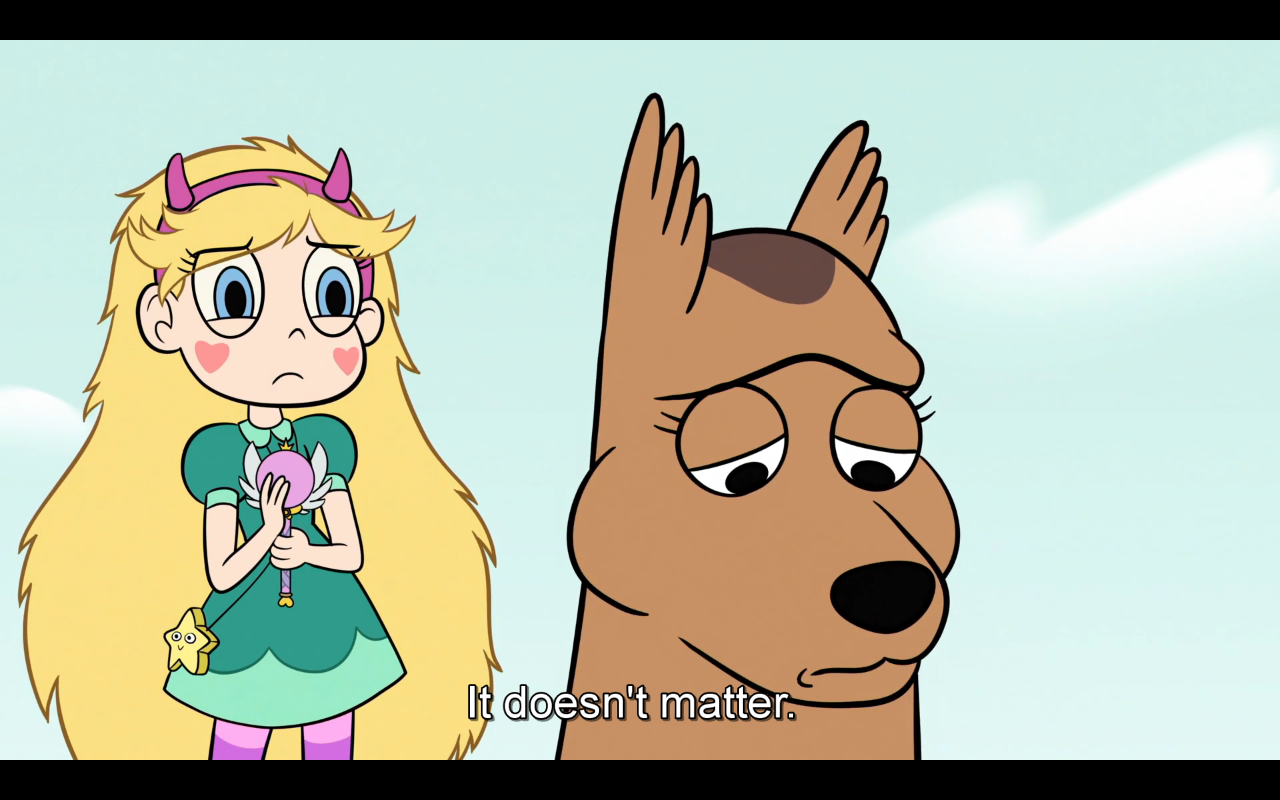
Now that’s depressing.
But here’s what’s really interesting about “Fetch”: the episode compares Willoughby to Star in a way that suggests that they want the same things.
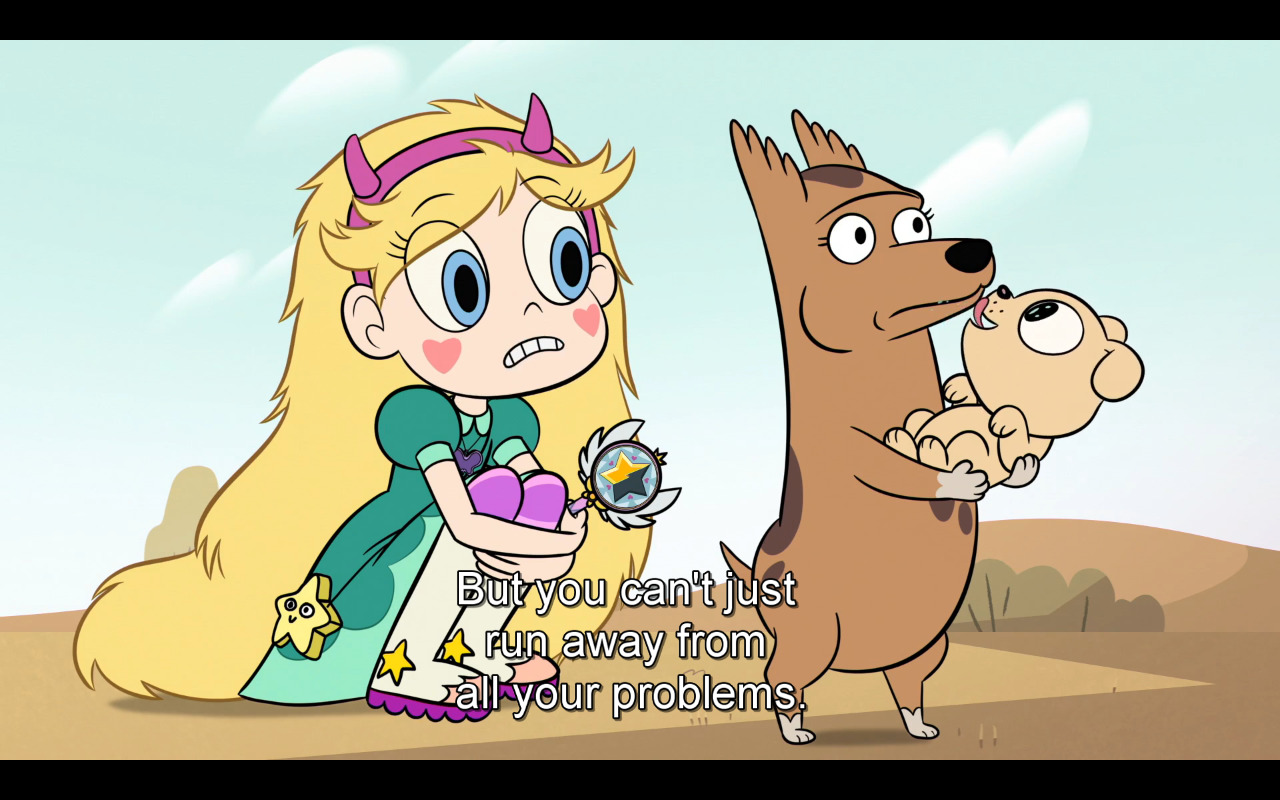
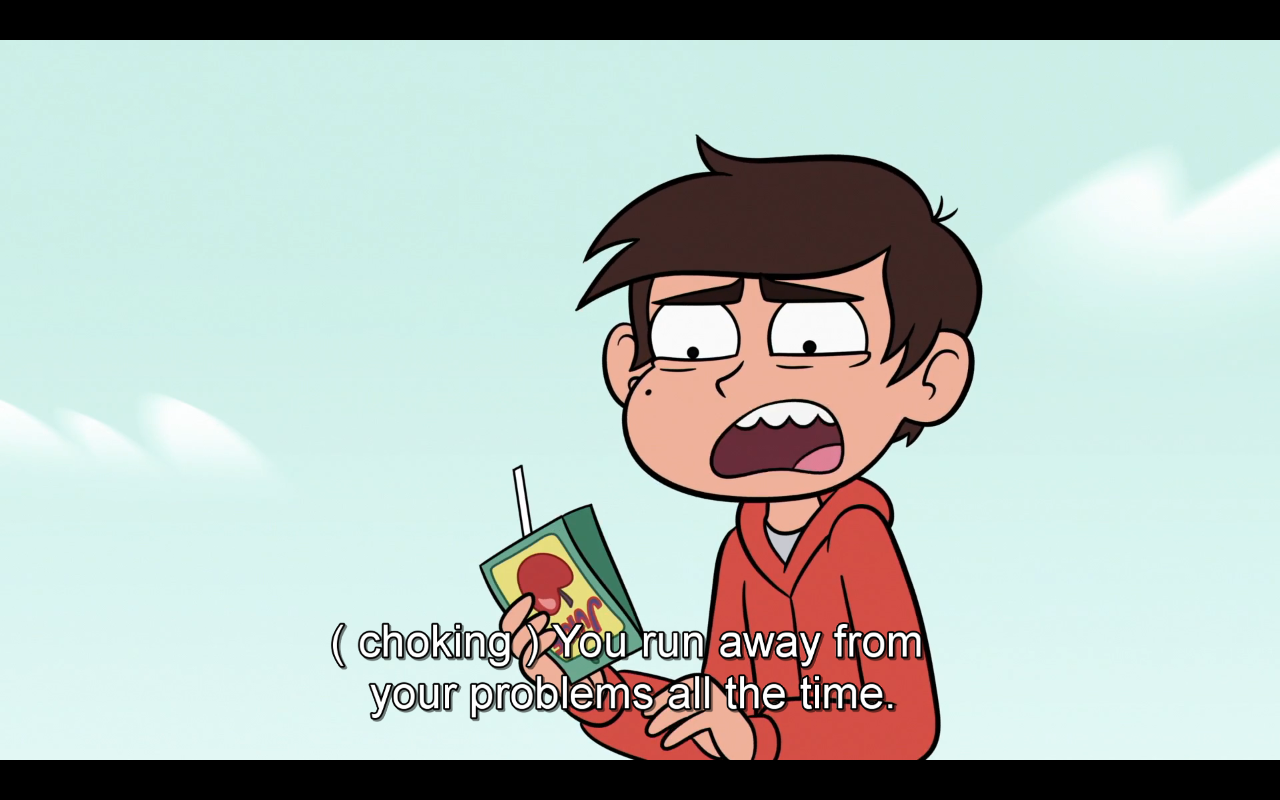
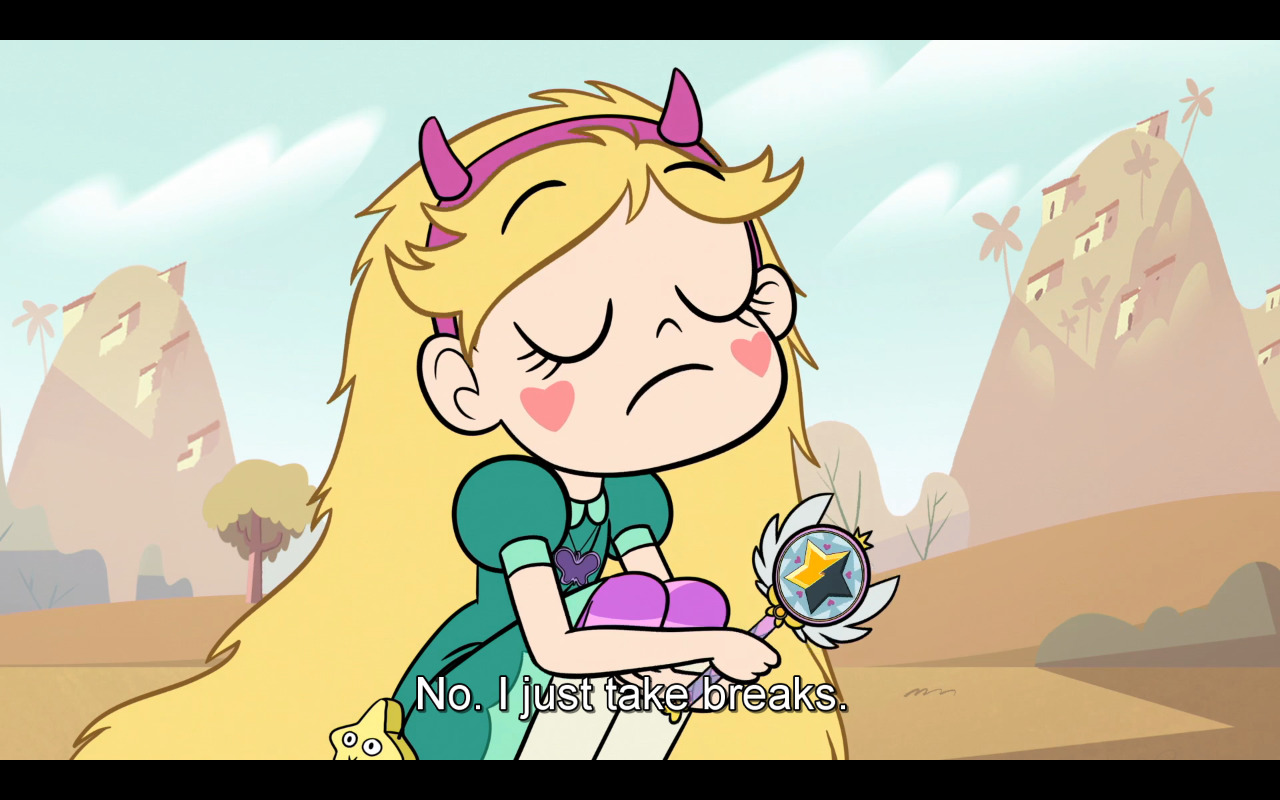
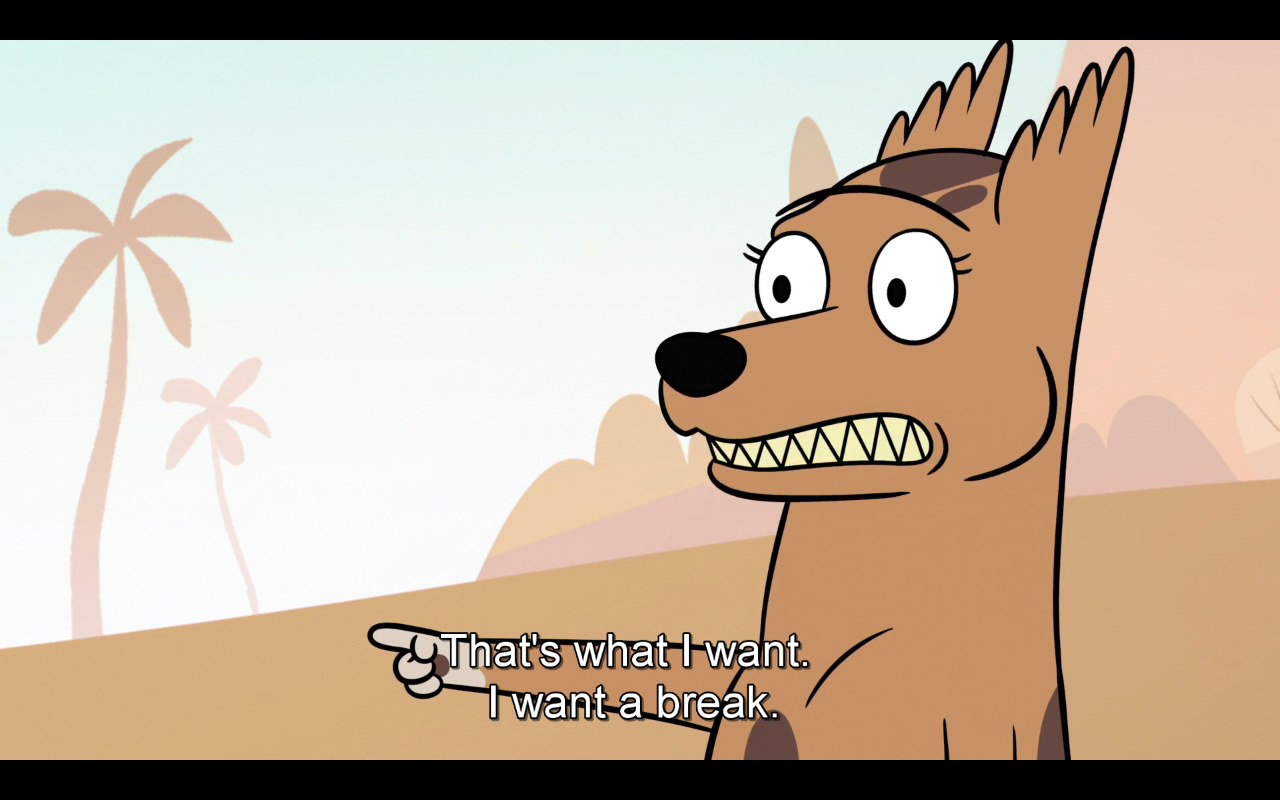
This is interesting because, as I mentioned earlier, Star is actually driven by her fear of losing her identity – it’s the same reason she’s so terrified of St. Olga’s Reform School for Wayward Princesses. Willoughby’s desire to extinguish her identity mirrors Star’s unconscious fear of her own identity being extinguished. Paradoxically, Star is running away from the very solution that Willoughby embraces, but it’s not something she can run from forever.
Furthermore, I think the comparison stealthily introduces the idea that forgetting who you are entirely is a plausible response to a troubling reality. Instead of dealing with your problems, just kill yourself – whether that’s a metaphorical death (i.e., discarding your identity and starting a new one, as Willoughby does) or, more unsettlingly, a literal one. Indeed, there is actually an earlier, less-refined iteration of this idea presented to us in “Marco Grows a Beard”:
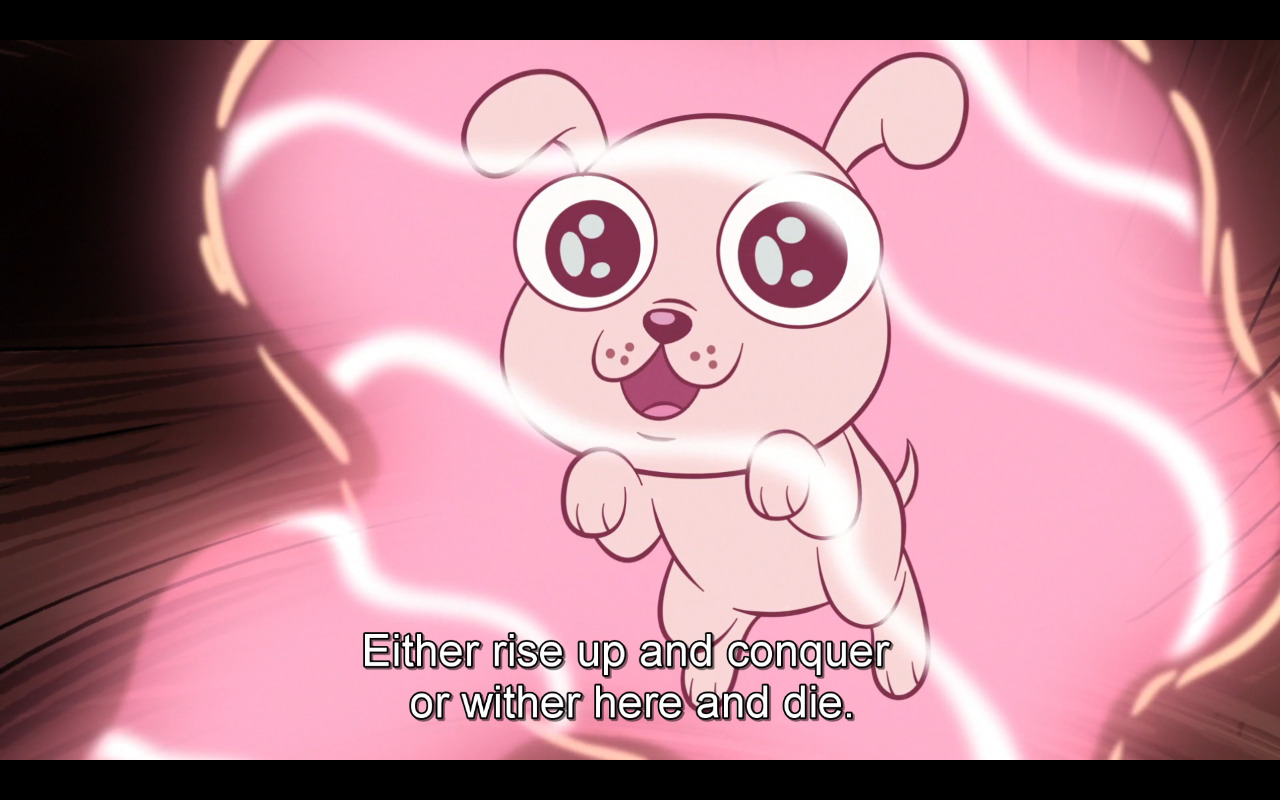
This is very much an idea that is comes from the French philosopher Albert Camus, who believed that life, with all its suffering, is absurd and that the only way to truly live is to confront and accept that absurdity. In his view, you always had the option to end it all if life became too much to bear. In his words:
There is but one truly serious philosophical problem and that is suicide. Judging whether life is or is not worth living amounts to answering the fundamental question of philosophy.
Willoughby chooses suicide; she chooses to metaphorically end her life by throwing away the person she once was and to instead become a new one, but I think Star does not yet consciously realize that she can make a choice. Her instinct is to run away. Later in this post, I’ll return to this idea of throwing it all away and explain its relevance to future episodes.
There’s one last thing I have to say about "Fetch”: even the very title of the episode has an alternate meaning that is tied in with the idea of identity. A fetch is a supernatural entity – an “apparition of a living person, specter, a double” that shows itself to someone as an omen of their impending death. Fetches look physically identical, and they portend death.
There are two ways I think this meaning is significant: first, Willoughby wants to “kill” her self and be born anew with the ability to simply live in the moment. I would suggest that there is a tenuous connection through the sense of looking at one’s doppelganger (or looking at one’s double in the mirror, as Willoughby does in the bathroom) and realizing that self will eventually die – a death which Willoughby openly seeks.
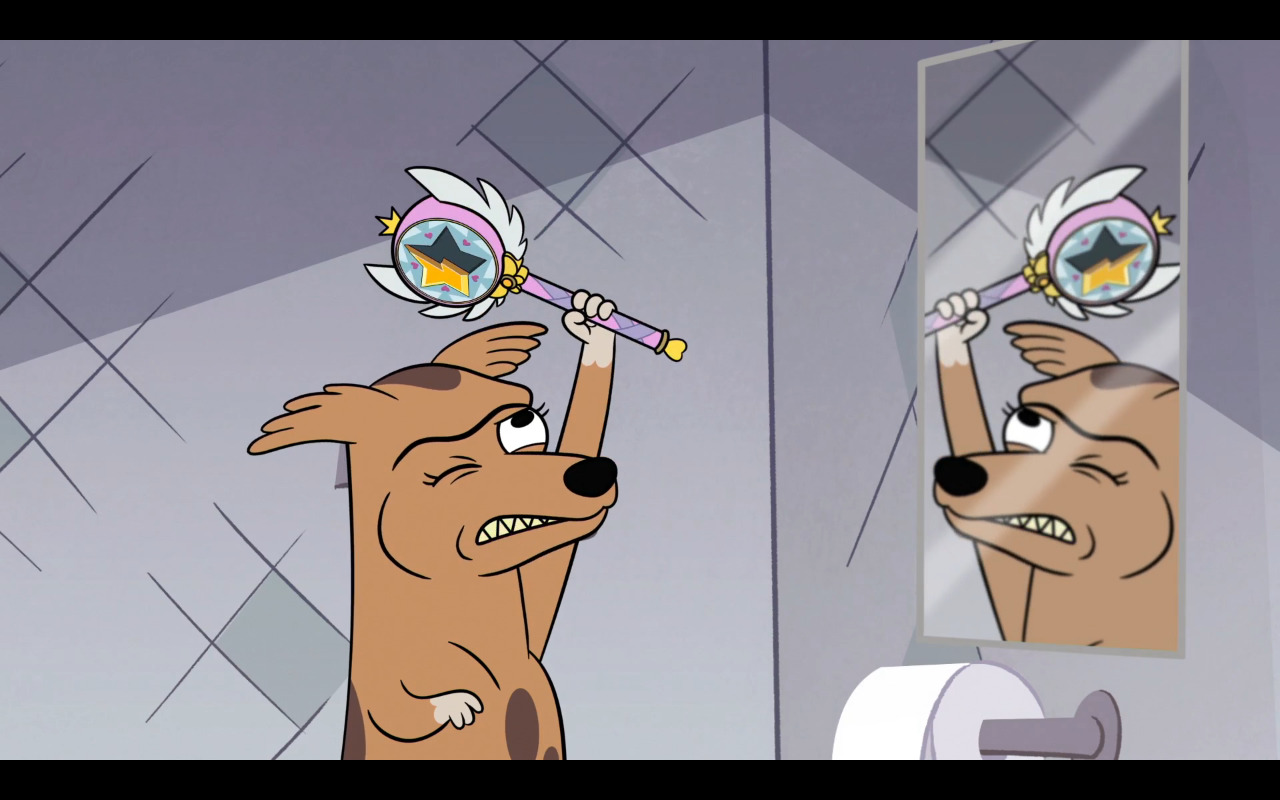
Second, as I’ve already noted, Star sees herself in Willoughby; they are mirror images of one another. Star runs away from her problems, and so does Willoughby. Willoughby decides to forget about her old life. What would Star do if she’s confronted with something of that magnitude? If "Butterfly Trap” is any indication, it seems we are about to find out very soon, indeed, what Star will do.
If anything in the series has given Star grief when it comes to her identity, it’s the idea of being sent to St. Olga’s Reform School for Wayward Princesses. The possibility comes up time and time again, and I think that Star’s grave fear of the place, even after Miss Heinous’s defeat, is a testament to her pure unconscious terror.
St. Olga’s Reform School for Wayward Princesses
Throughout the first season, Star is shown to be terrified of the place:
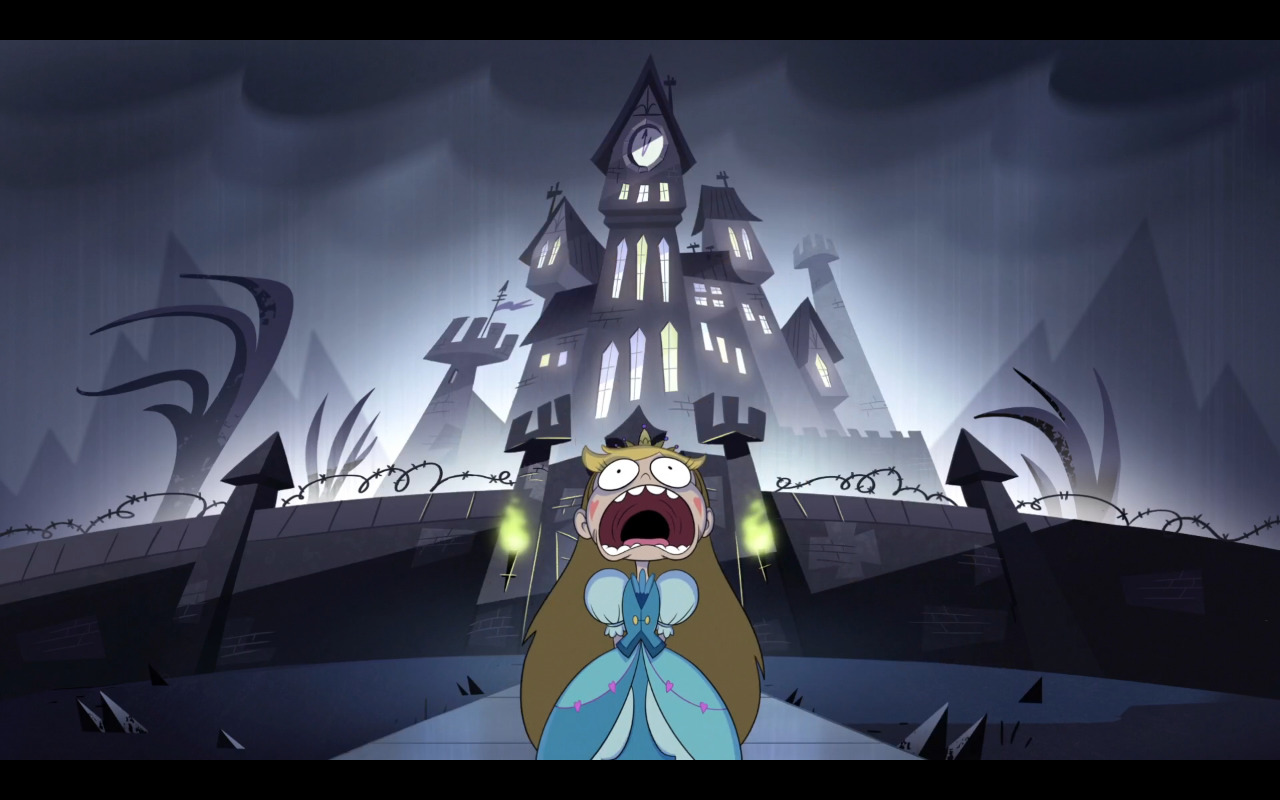
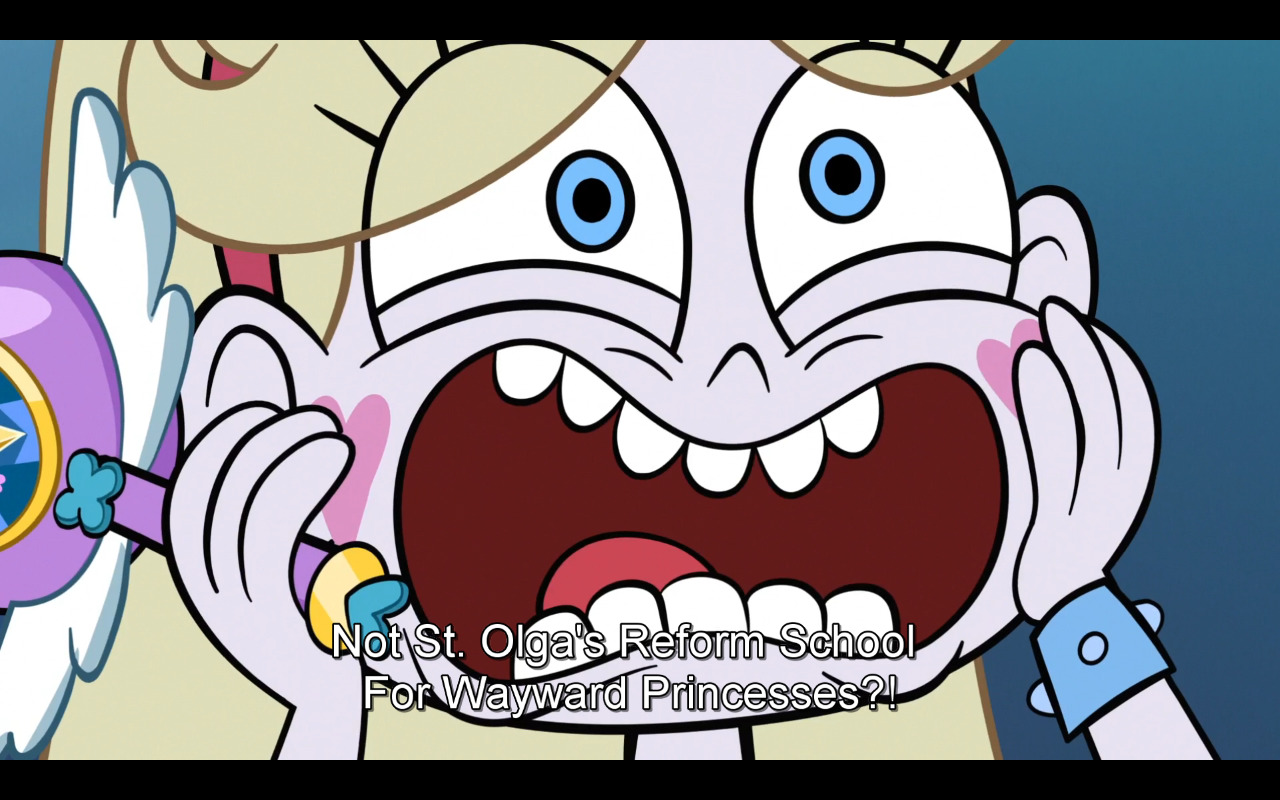
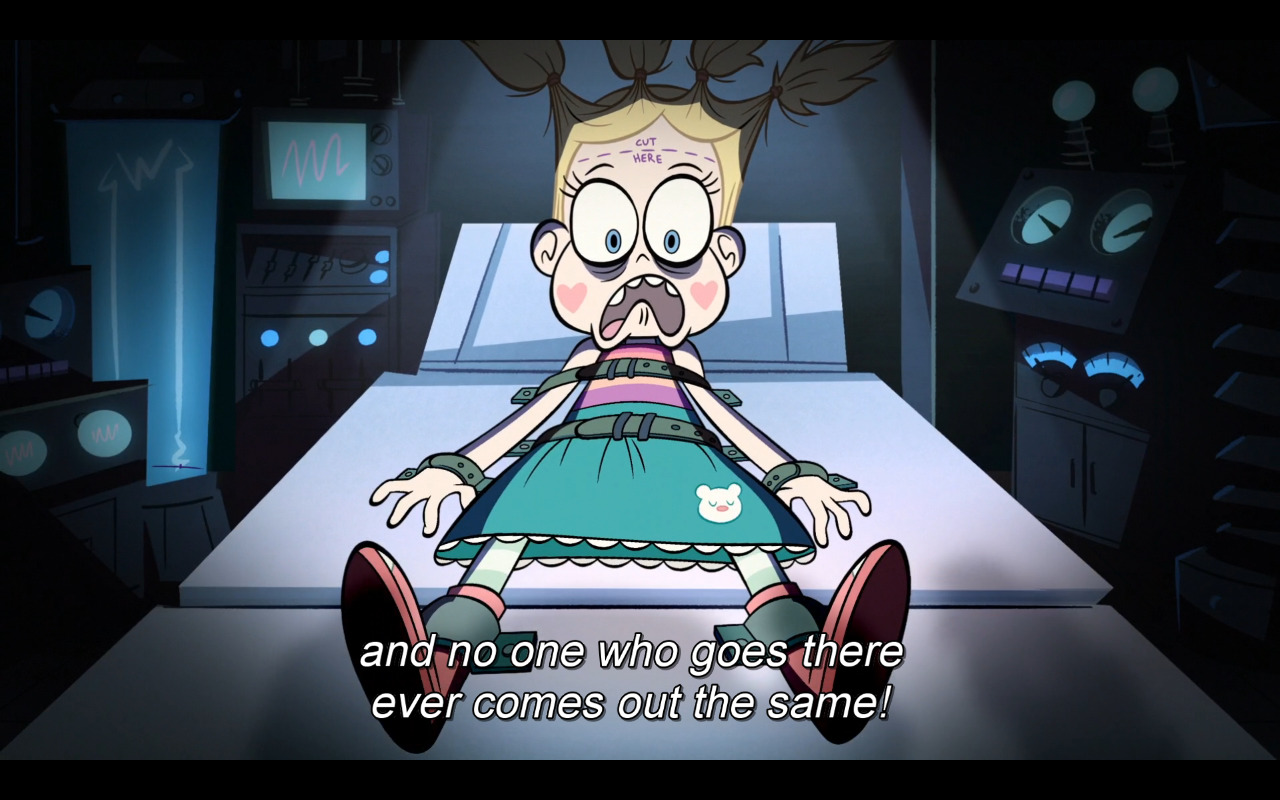
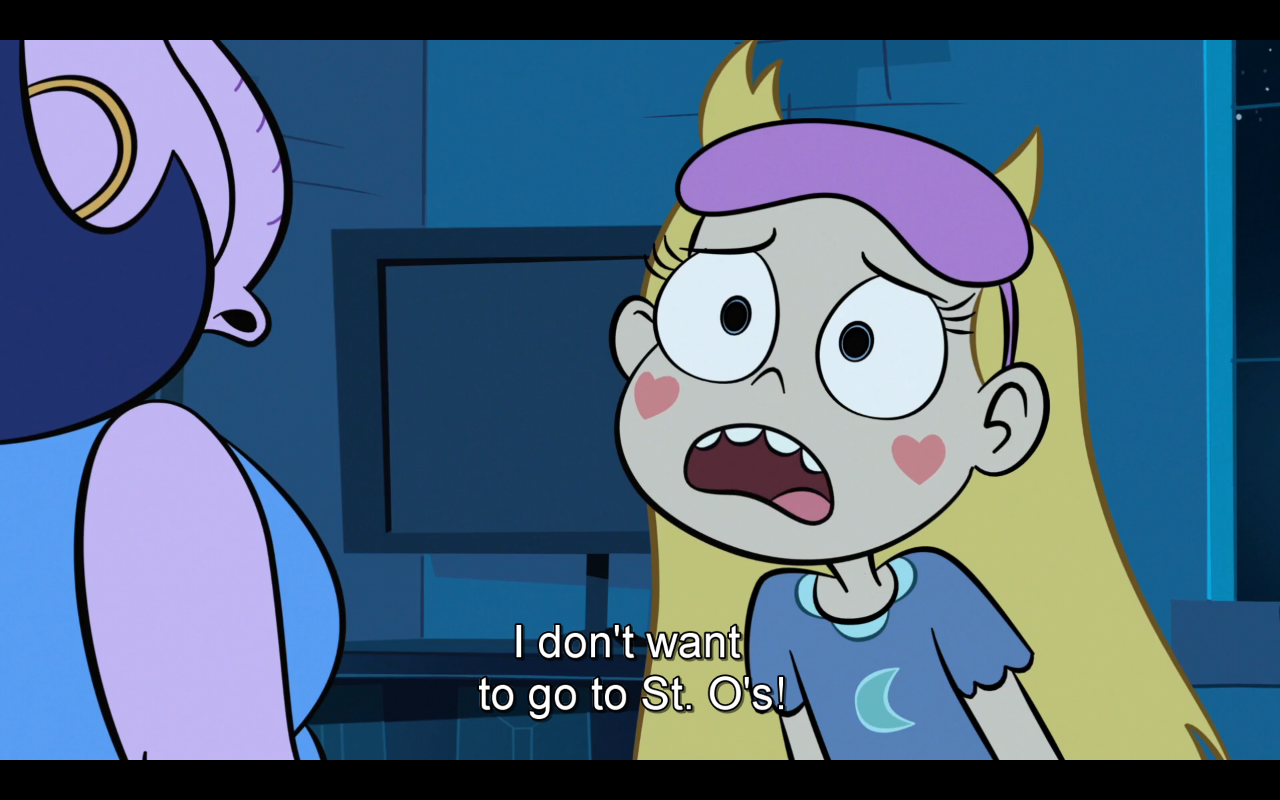
That fear is later shown to be entirely justified in the episode of the same name:
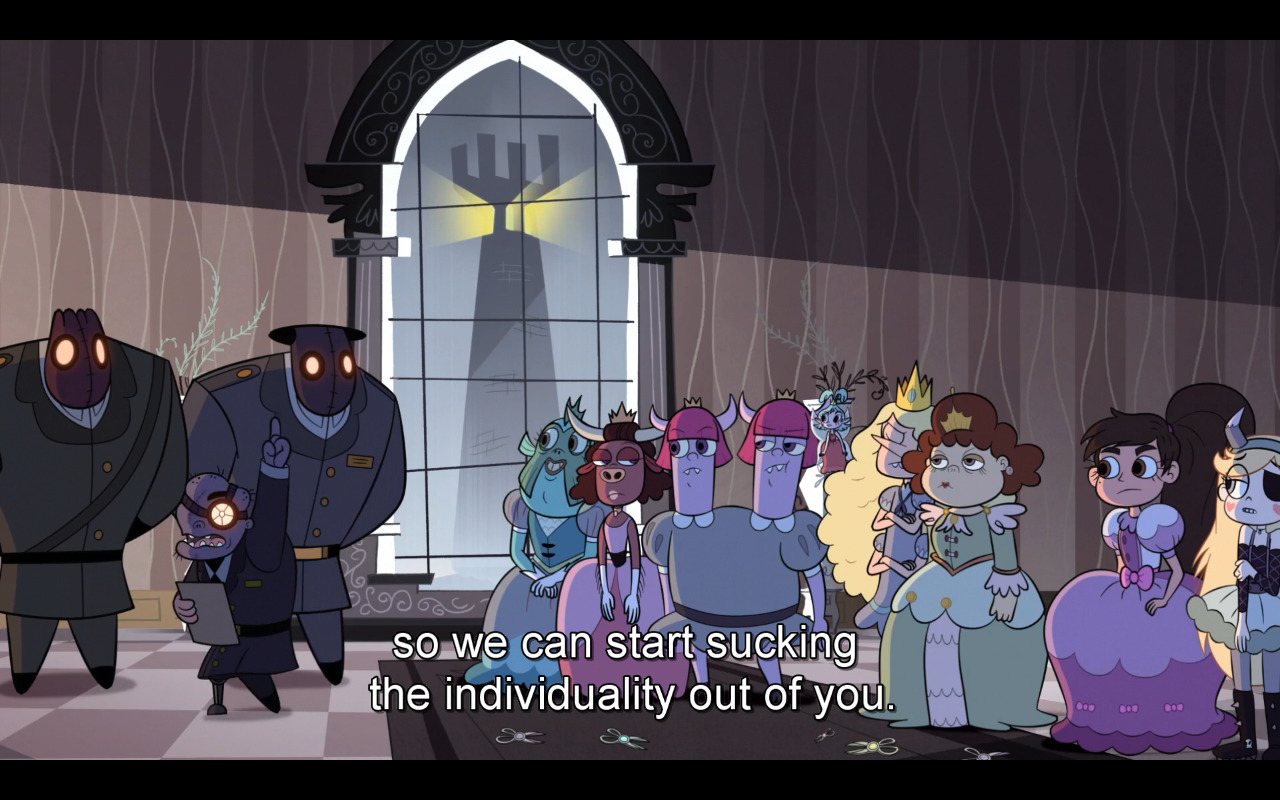
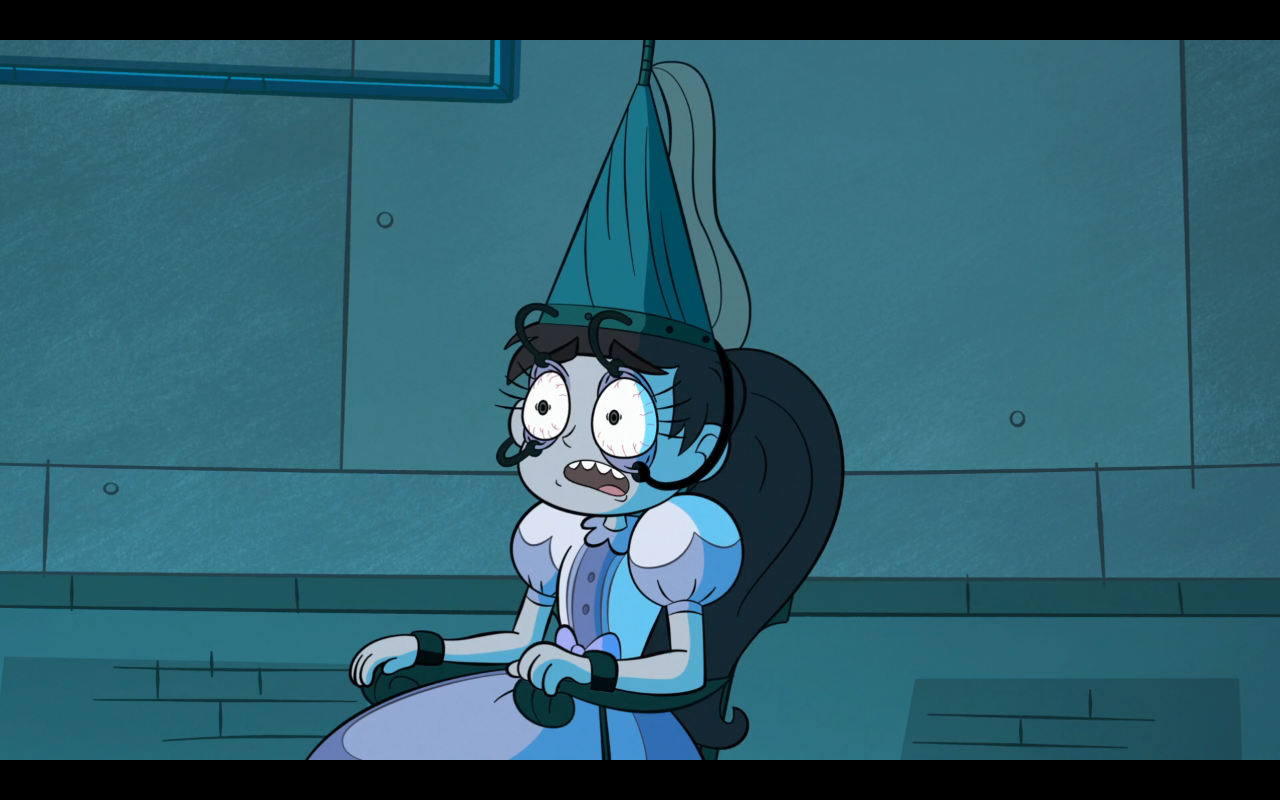
As we learn in this episode, the school actually brainwashes princesses in order to crush the individual spirit and identity of each princess and turn them essentially into automatons. This is about as concrete an example of identity loss as Star vs. the Forces of Evil has ever presented to us.
I think the reason Star is so frightened of the school is because she intuitively understands how awful it is to have your individuality stripped from you – on some unconscious level, she knows just how fragile her identity is, how easy it would be to extinguish her. Note that, of all the princesses, Star is the only one who looks truly terrified to be there:

She may not be able to consciously express to Marco her fear of losing her identity, but she eventually does get through to him how truly terrible it is:
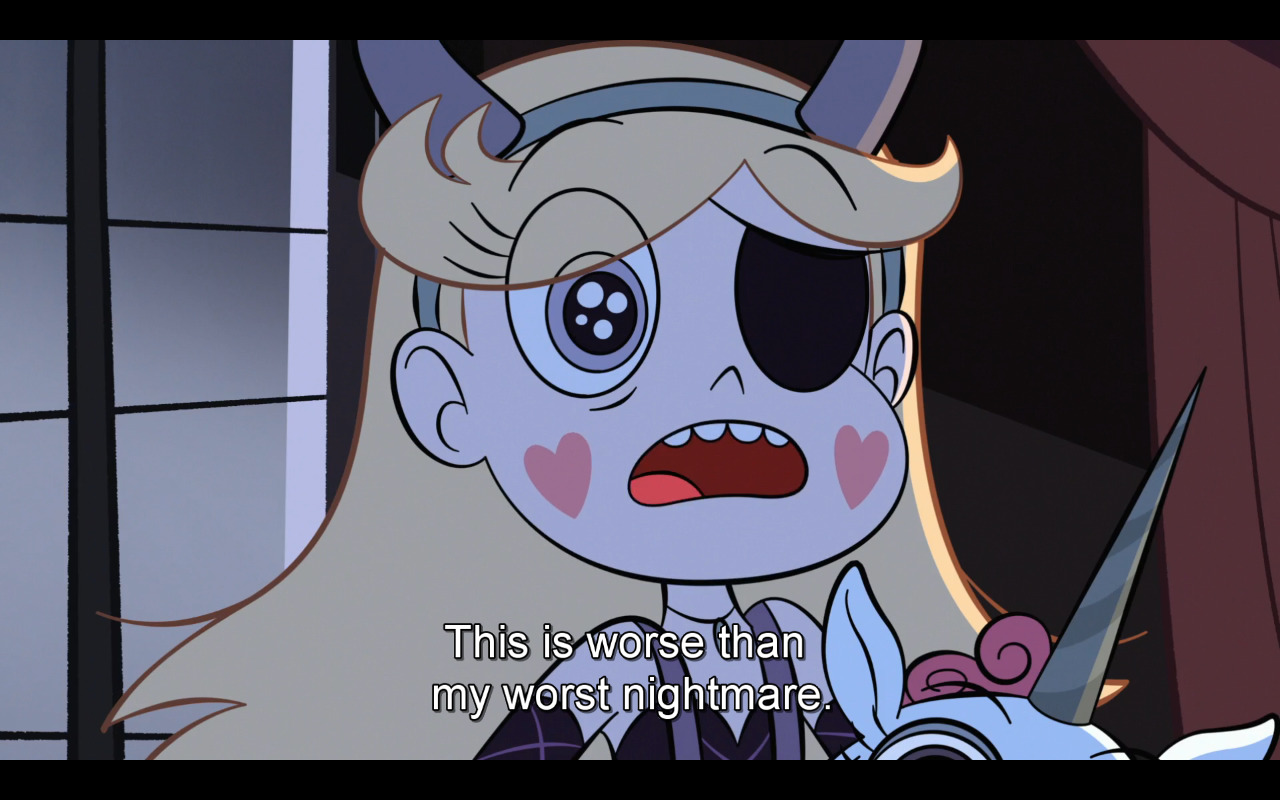
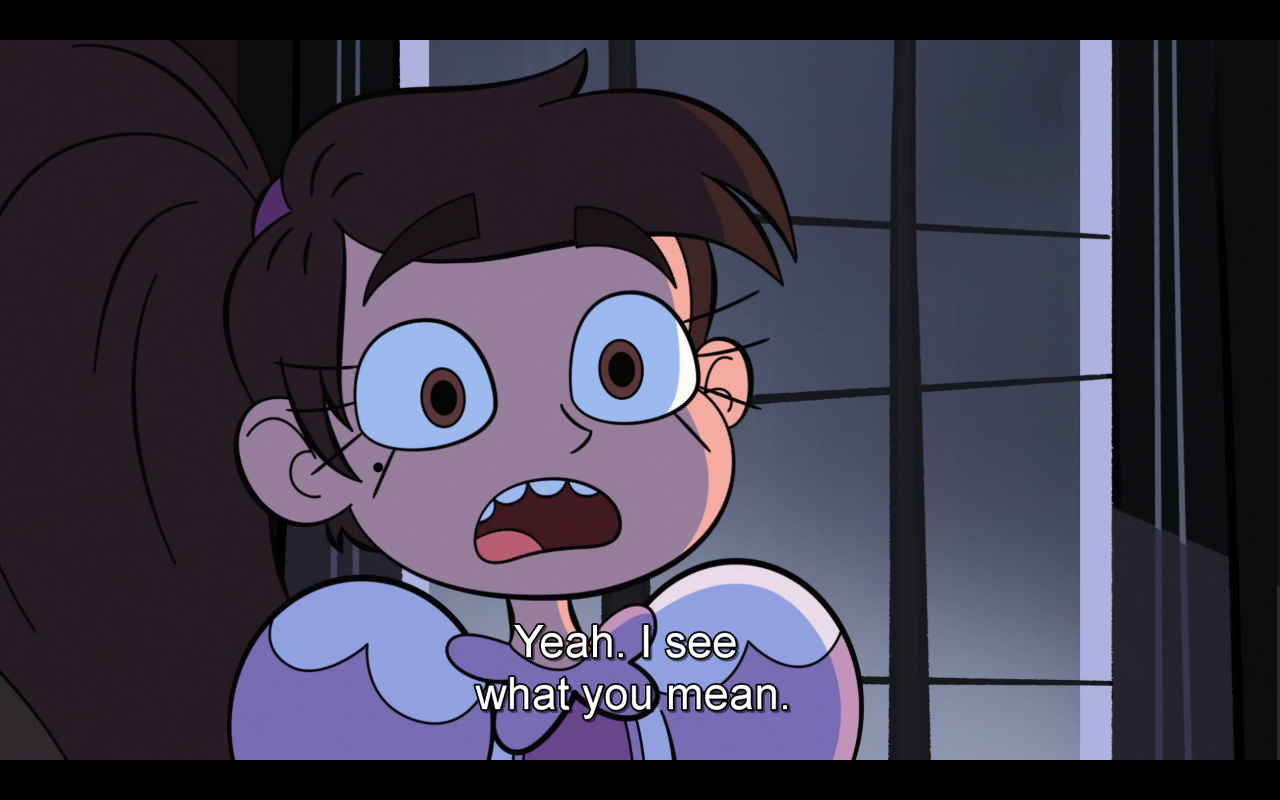
What Star is feeling without being to express it is a fear of metaphysical death: that is, ego death, the utter destruction of her self. Ordinarily, in the mythopoetic considerations of Joseph Campbell and others, ego death is understood to be a good thing: a transitional stage for heroes and mystics in their quest to become fully conscious of existence – that is, to obtain a broader awareness of others and the universe itself – and that process can only begin through the extinction of the self. Instead, Star mocks this idea at the end of the episode:
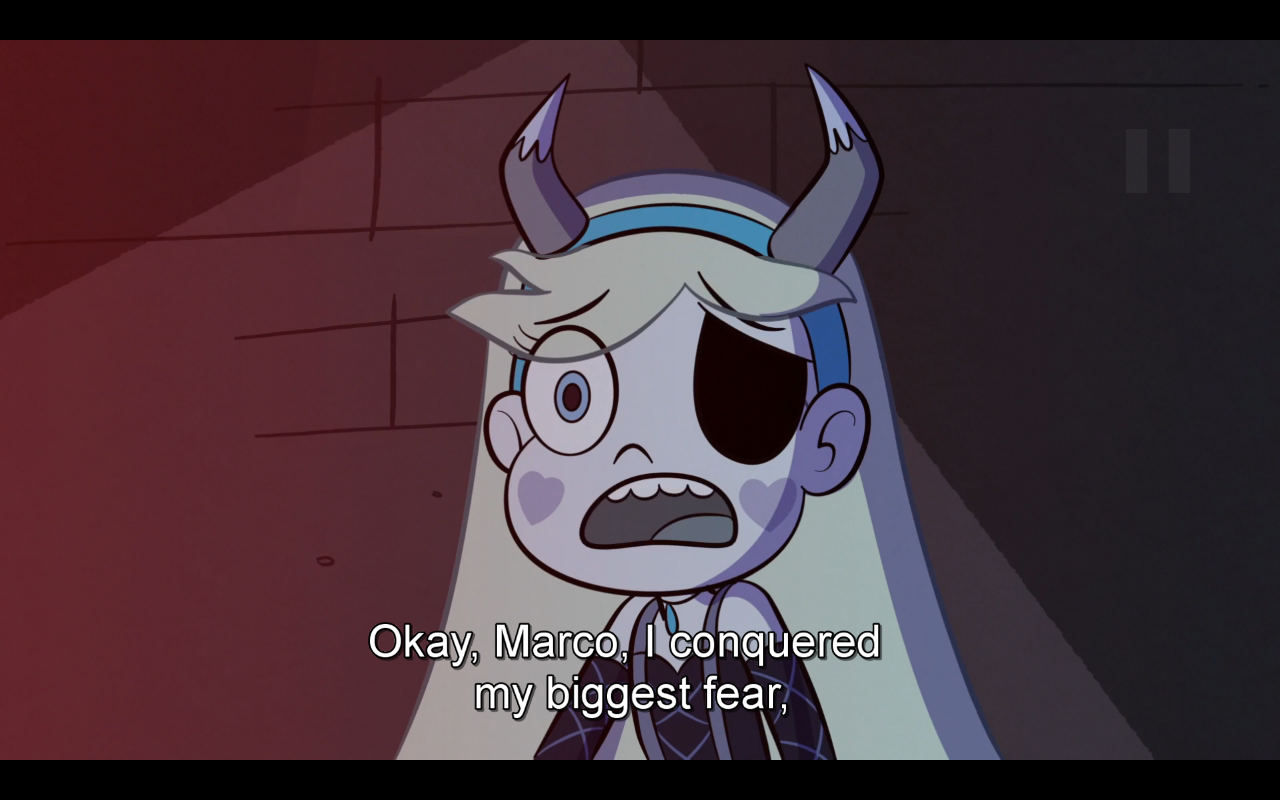
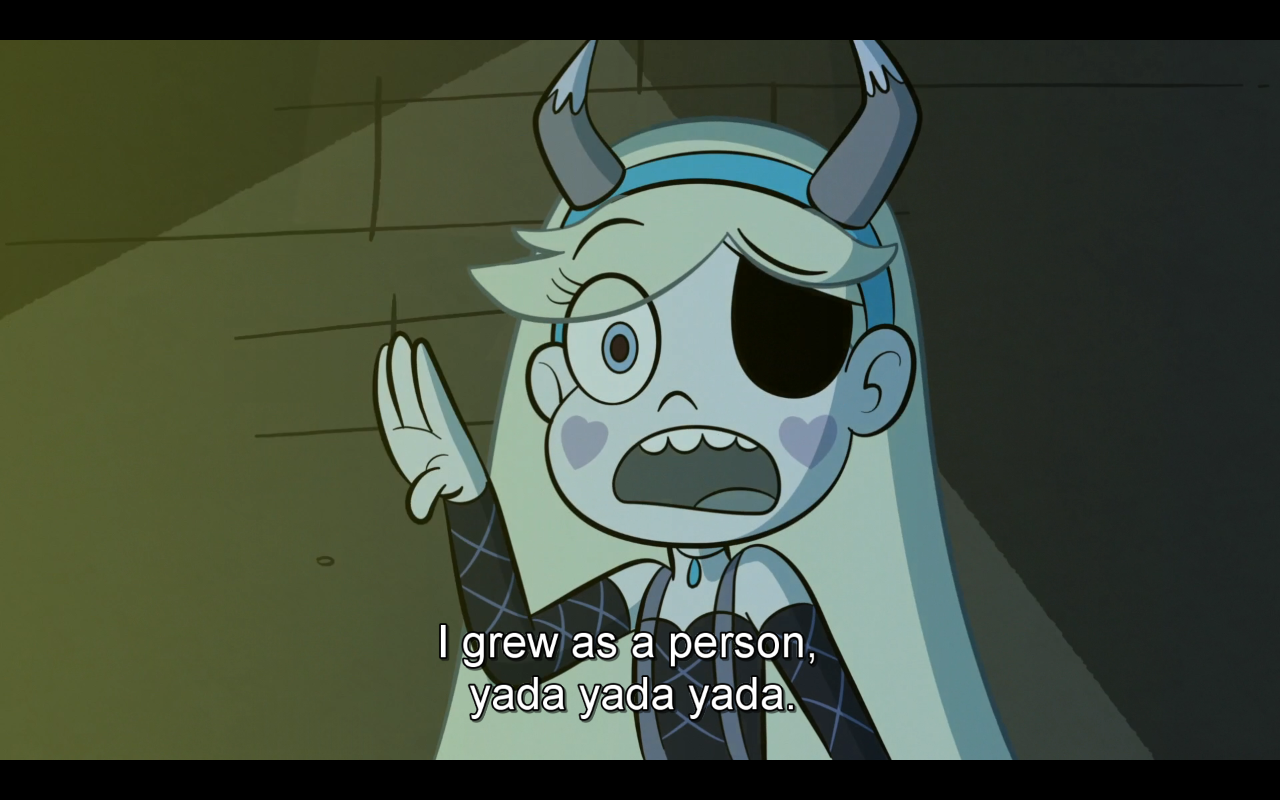
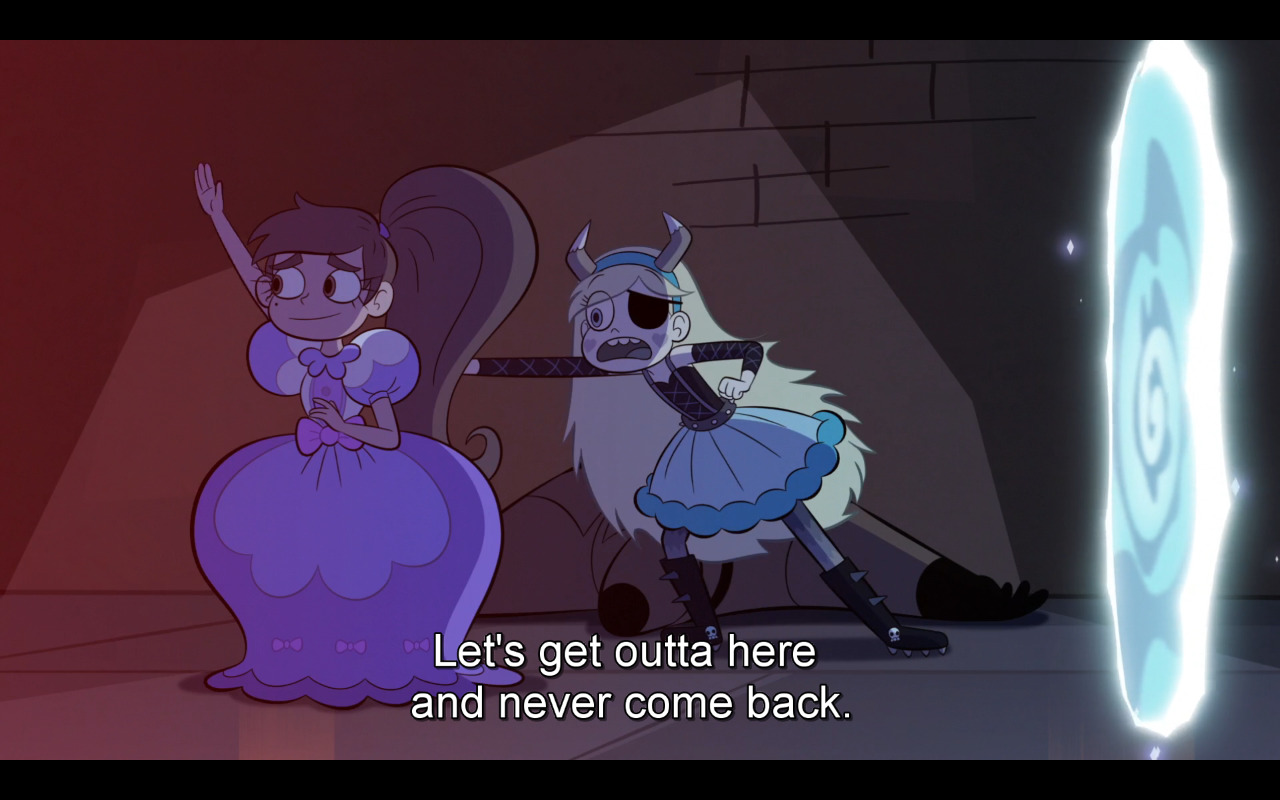
Star is so afraid of what the school represents – the loss of her identity – that even after Miss Heinous is defeated and the other princesses hold a party, she simply wants to leave as quickly as possible. It’s at this moment when Star’s unconscious fear, the one that has driven her throughout all three seasons, is brought closest to the surface. She is truly vulnerable, and she doesn’t know that she knows how vulnerable she is, and that is heartbreaking.
What’s also heartbreaking is the character of Miss Heinous – that is, Meteora. Meteora has lost her identity at least twice: first, her status as a royal was stripped from her due to her monster ancestry, and she was exiled to the monster temple (and probably raised in some pretty dire conditions). Not only this, though, but she also lost her status as the reform school’s headmistress in a crushing, humiliating defeat.
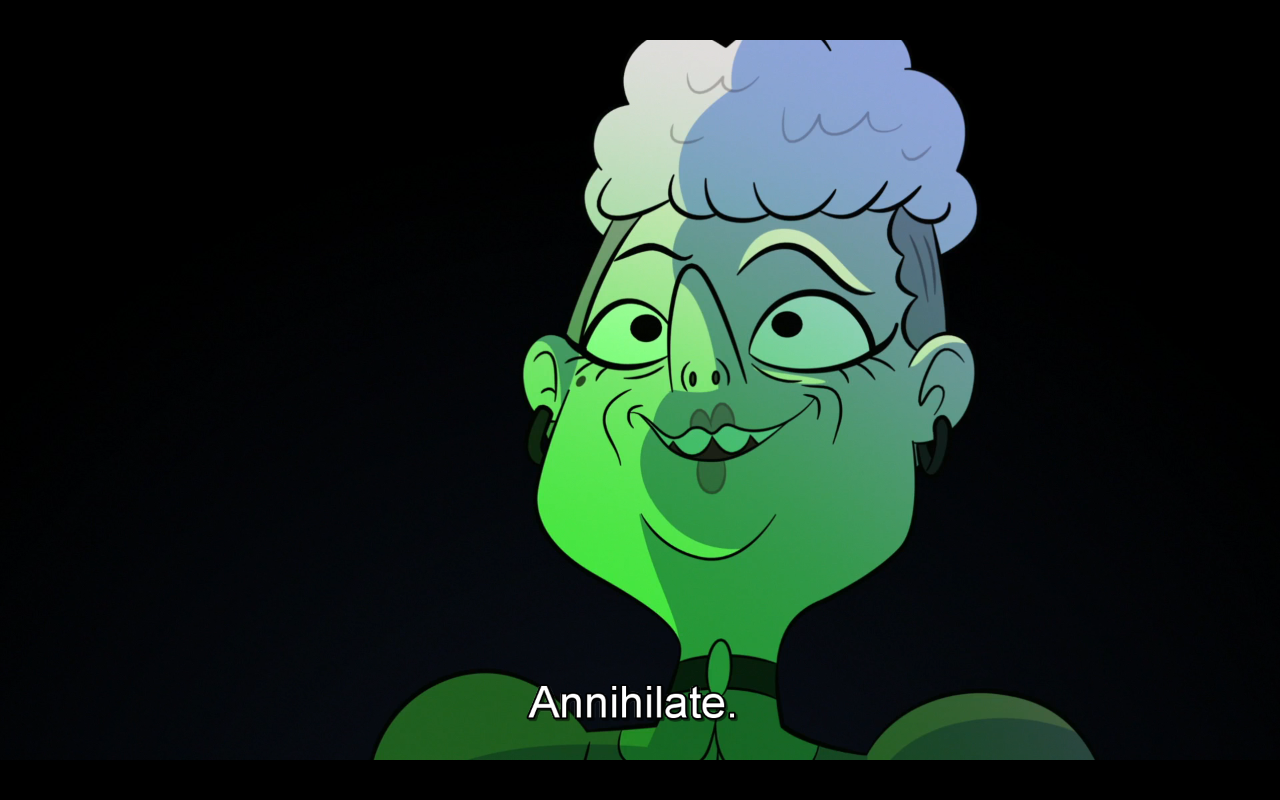
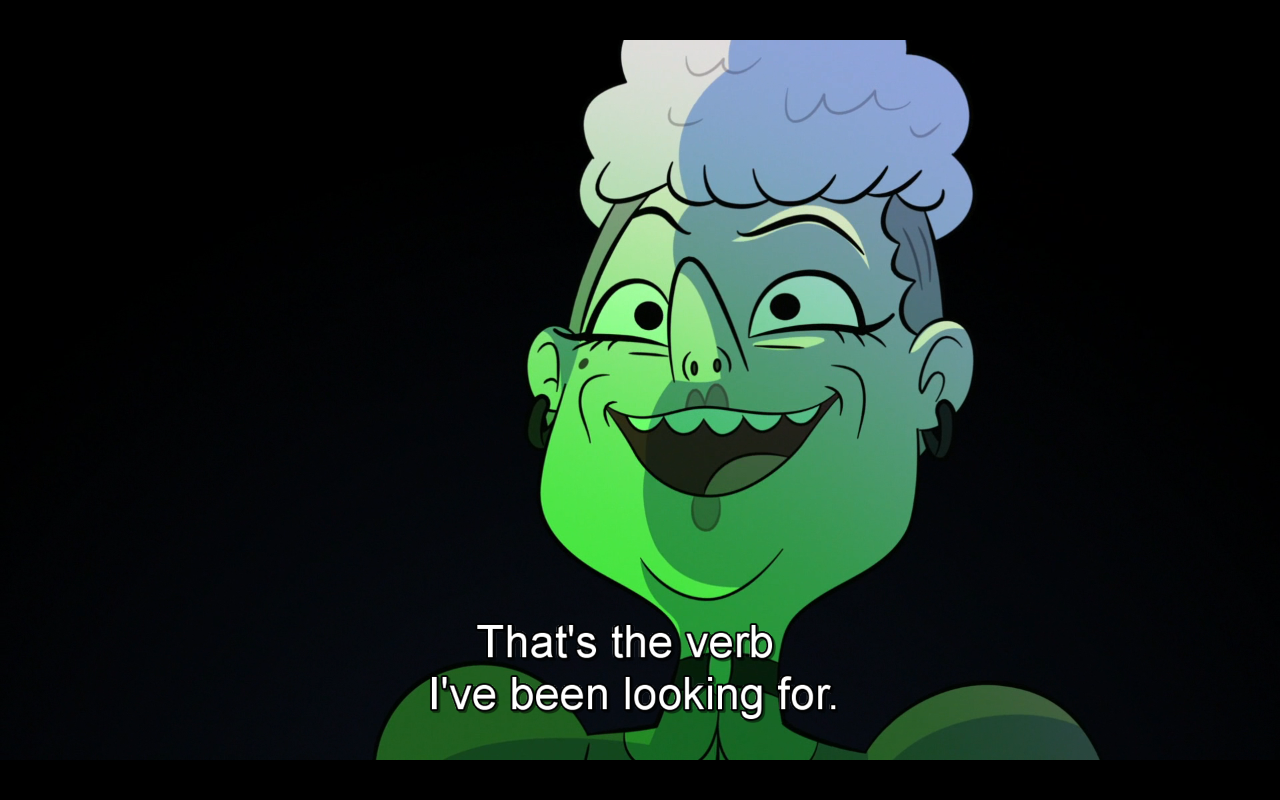
Meteora represents the death of the self. There’s so much significance and sorrow tied up in her character; not only has she forgotten who she is, she has also embarked on a campaign to make other princesses forget who they are, too. It’s all pretty awful, frankly, and I feel sorry for her. I suspect that’s how the audience is supposed to feel about Meteora at this point, but who knows what direction her character will take in the future?
Meteora’s personal tragedy and her relationship to Eclipsa – who, as of “Butterfly Trap”, has been shown to have her own destabilizing presence – reinforce the broader theme of identity loss. Many of you have already remarked on the identity crisis that Star no doubt seems to be suffering as of “Butterfly Trap”, and you are absolutely right about that. There is a way out for Star, however – and it’s ego death.
The Transformative Power of Loss
If there’s one thing that Star vs. the Forces of Evil is all about, it’s metamorphosis. From the fact that the Butterfly women can turn into butterflies (and literally undergo metamorphosis in the form of Mewberty) to the metaphorical significance of magical girl transformations, metamorphosis is one of the central themes of the series. And metaphysical death – that is, ego death – is a type of metamorphosis.
Earlier, I spoke briefly about Joseph Campbell and ego death, but I think that’s the way out for Star – the way for her to conquer her fears. Instead of seeing identity loss as something to be avoided – that is, avoiding unpleasant truths about her kingdom, her family, and her self – she could embrace the loss as a force for change – a chance to forge something new.
In earlier seasons, Star learned about her kingdom’s dark history of monster oppression, and, while that did shake her, she has used that knowledge in season three as a catalyst for change, to fix the relationship between Mewmans and monsters. Unfortunately, Star has been relying heavily on her identity as a princess to fix it:
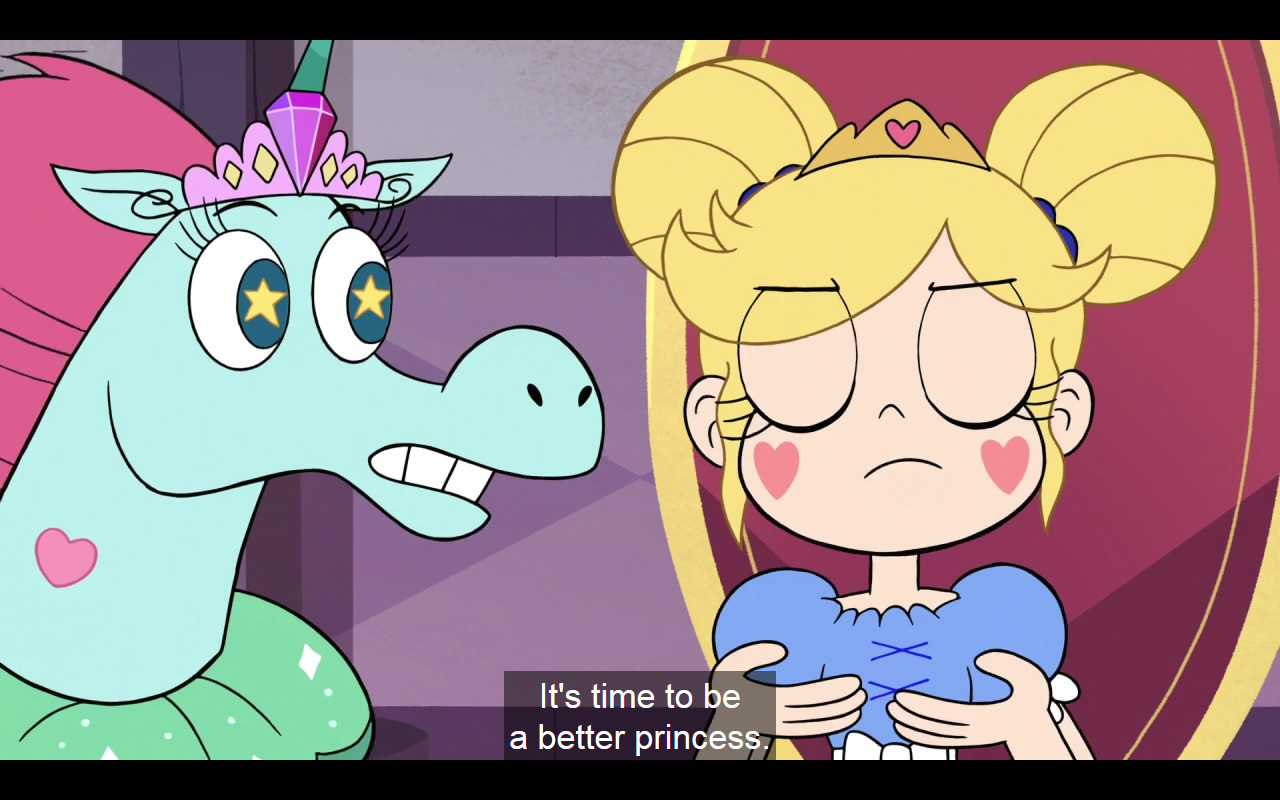
But now that identity has been lost:
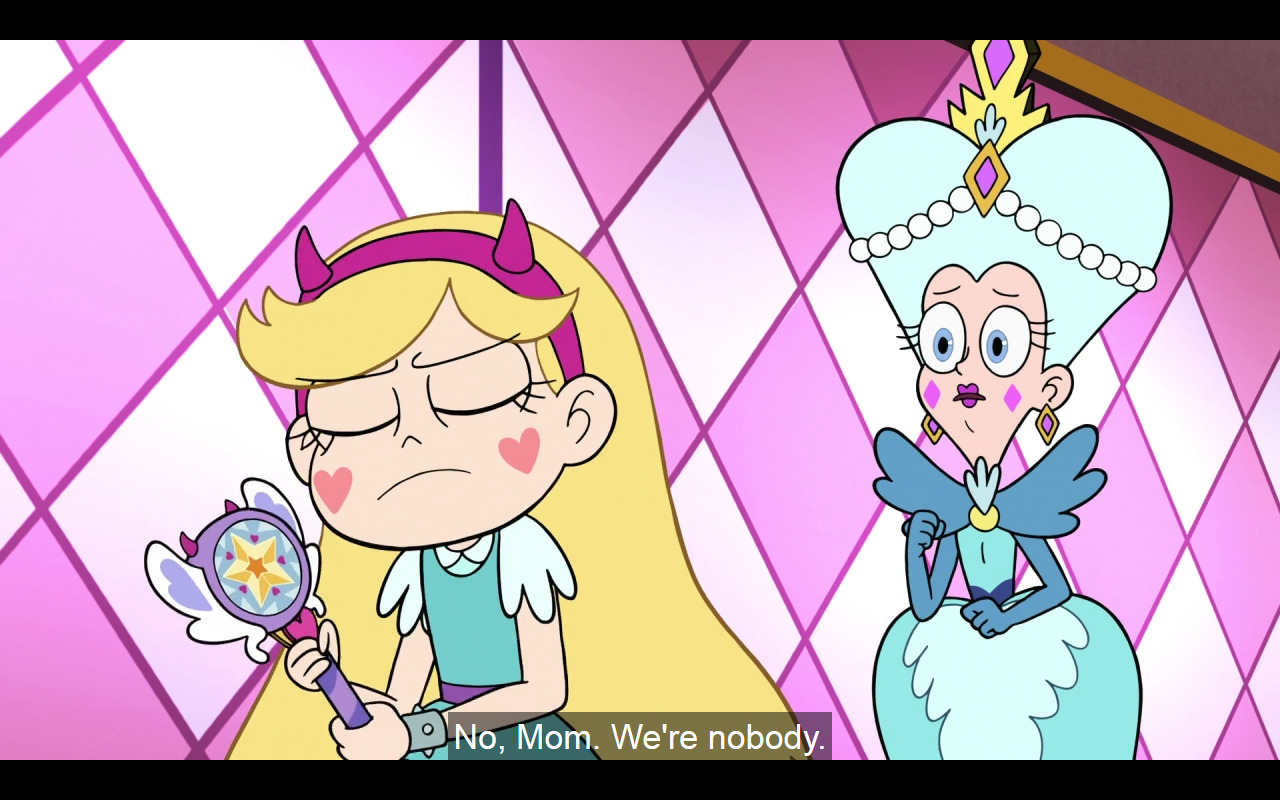
Instead of seeing Eclipsa’s revelation as simply losing a part of herself (and thus falling into despair), Star could view it as yet another opportunity to change and grow. That’s what Campbell, Jung, and others intend with their conception of ego death: undergoing “a fundamental transformation of the psyche” in order to more fully understand one’s “true purpose of life.” Just because Star isn’t really a Butterfly doesn’t mean that she can’t continue her goals of helping monsters; if anything, she is more relatable to them, now, given her descent from a simple commoner.
Yet as cheery as that outlook is, I can’t help but have a sneaking suspicion that things are only going to get worse for Star. And they absolutely can – they can get much, much worse.
The Terrible Suspense of the Loaded Gun
A looming pendulum casts its pall over the series, now. Nothing is sacred. No one is safe. A horrible realization of what comes next slowly unfolds. Do you know what I’m talking about?
That’s right.
Mind Eraser.
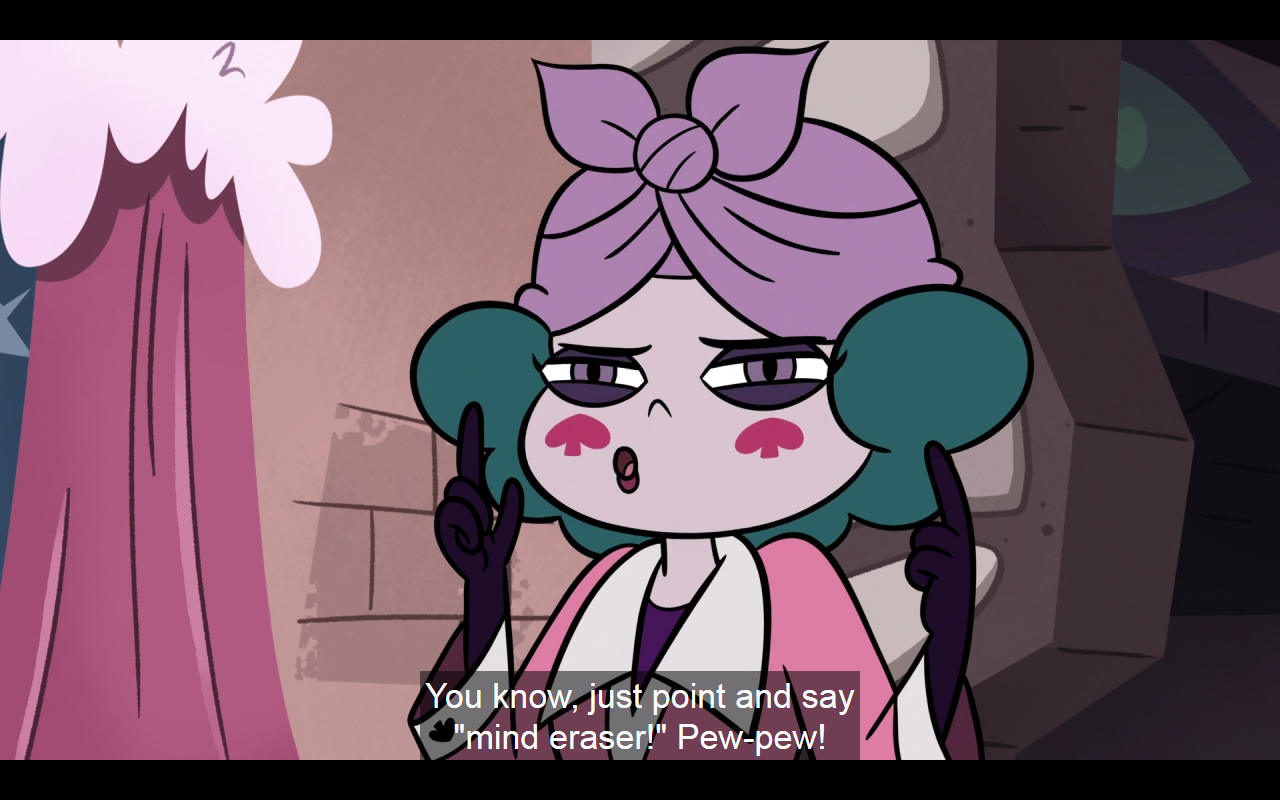
Despite how frivolous Eclipsa is about the spell – and how careless Moon is with it – Mind Eraser is a truly dreadful spell that can erase one’s memories. For all my talk about the transformative power of ego death, it’s insignificant in the face of not remembering what happened to you.
We don’t know how powerful Mind Eraser can be, either – it could be powerful enough to wipe all of someone’s memories, completely erasing who they are. I would suggest that, morally, it’s many times worse than Meteora’s brainwashing. Meteora, at least, had a purpose with her brainwashing: with Mind Eraser, you can simply torture someone – forever.
Here’s some relevant dialogue from The Good Place that may shed some light on how dire Mind Eraser is:
We are experiencing karma, but we can’t learn from our mistakes, because our memories keep getting erased. It’s an epistemological nightmare.
That is precisely the threat that Mind Eraser presents: a fate worse than death. With death, your suffering will at least be over, and other people will carry on their memories of you, but if your memory keeps getting erased – if you keep repeating the same mistakes over and over, unable to learn from them – then you are in a living hell without even knowing it. Not even poor Sisyphus loses his memory once the boulder reaches the bottom – at least he knows he’s being tortured and can choose to smile, as Camus suggests, in the face of his absurd existence.
I truly cannot emphasize enough the horrendous consequences of introducing something like Mind Eraser into the series. Everything is at risk. Every episode, every interaction, every line of dialogue. Every second of history. Everything.
With two words, everything that we have ever loved about Star – or Marco, or Queen Moon, or anyone – could be utterly destroyed, and none of it will have meant anything at all. The person they were will just be gone, gone forever, and there would be nothing that anyone could do about it – least of all you.
Do you feel afraid now? Did I make the hairs on the back of your neck stand up? If so, good. Now you feel what Star feels: the fear of the death of the self. That’s the fear lingering behind every single episode of Star vs. the Forces of Evil. And that fear is real.
So It Goes
I hope you enjoyed reading this analysis, and I hope it caused you to see Star vs. the Forces of Evil in a new light. I’m certainly wishing now that I had finished this post earlier – if only I’d posted this before “Butterfly Trap”! I had a hunch that the series would play with the notion of Star being a princess, since it was the next logical step in slowly deconstructing her identity.
The series is not done with that deconstruction – not by a long shot – and it’s probably going to be pretty heartbreaking to watch. But it has to be done. The series has to both pay homage to the magical girl genre and, ultimately, destroy it in order to create something new. Too, that’s part of why I think Mina is one of the “bad guys”: she symbolically represents the old order of magical girl anime that must be fought, killed, and buried.
There are a lot of examples of small identity crises or identity-related fears that Star has, and I left them out in the interest of time. But since I really enjoy lists, here’s a (not exhaustive in the slightest) list of some major ones – again, from Star’s perspective:
- “Sleepover”: I’m not really sure what I feel anymore.
- “Into the Wand”: I almost got replaced with a clone of myself, and that was super scary.
- “Face the Music”: I thought people wanted to know the real me, but they don’t.
- “Deep Dive”: I almost forgot who I was entirely – even my own name.
- “Stump Day”: I’m not even allowed to celebrate my birthday and validate my existence as an individual.
I think “Stump Day” is particularly neglected with regard to analysis, since people may have missed the psychological implications of Star not being able to celebrate her own birthday. It’s quite sad when you really think about it.
I know I may have been a touch light on philosophy in this analysis, but I have to admit that philosophy in general (to say nothing of the philosophy of self) is not my strong suit; I’m more familiar with critical theorists on the literary side of things. That being said, even a cursory overview of existentialists like Sartre and Camus will point you in the right direction.
If you’re interested in animated works that explore the concept of self and being, then I (of course) highly recommend watching Neon Genesis Evangelion. Watch the original 26-episode series, then watch The End of Evangelion. (Please don’t ask me any questions about the Rebuild, though, as I have yet to watch any of those.) For a more comedic take on ontology, I also recommend the lighthearted animated short by John Weldon, "To Be”.
I don’t know what I’m going to work on next, but I’m going to try to keep writing. Feel free to send me any questions you may have on this analysis or to make suggestions of topics for future ones. You can also read more of my analyses and theories here. Thank you for reading! See you again soon.

